From The Screenwriting Lab to ‘Rental Family’ : Hikari on Creating Authenticity in Her Films
“It doesn’t have to be a big idea. It could start small.”
For writer/director HIKARI, the truth to an idea is far more important than the size of one. The Screenwriting Lab Fellow believes that finding a story that you feel passionate about is the key to success.
“It takes time to make movies… and if I make it, it has to be very special.” For HIKARI, it’s critical to be making the story she feels like she’s supposed to be making. With her latest film, Rental Family, that story is a fish-out-of-water tale about an American actor who starts working for a Japanese rental family service, played by Brenden Fraser in his first role since winning the Academy Award for Best Actor in 2023. These services hire actors to stand in for a missing or nonexistent person in real people’s lives.
The feeling of disconnection of both Fraser’s character and the people who needed the human connection that rental services provide spoke to HIKARI. “I came to America when I was 18… Being a foreigner in a culture where you don’t feel like you belong, there’s instant loneliness, right? There’s nobody who looks like you, who speak your language, who understand what you’re all about.
“Also, the world we live in now where everybody uses devices as tools to communicate, there’s far less physical connection and interaction amongst people, even friends,” she said. “That’s something that I was figuring out, like, how can we close those gaps between the people without the devices? What can we do to make people feel more connected?”
HIKARI credits Film Independent for helping find her community in the film ecosystem. She helped a friend on a Project Involve set as a producer, and it opened up a new world for her. After seeing the Artist Development Labs in action, she applied and was accepted to take her first script through the Screenwriting Lab.
“Having all the fellow giving you feedback and meeting the mentors, who have read our scripts and provide us their thoughts, or just even learn about their experiences, that was just more than anything that I could ask for.” She recalled talks from Sean Baker (Anora), and Matt Ross (Captain Fantastic), as amazing learning opportunities and credited the Lab with helping her see a career beyond just the film she was working on.
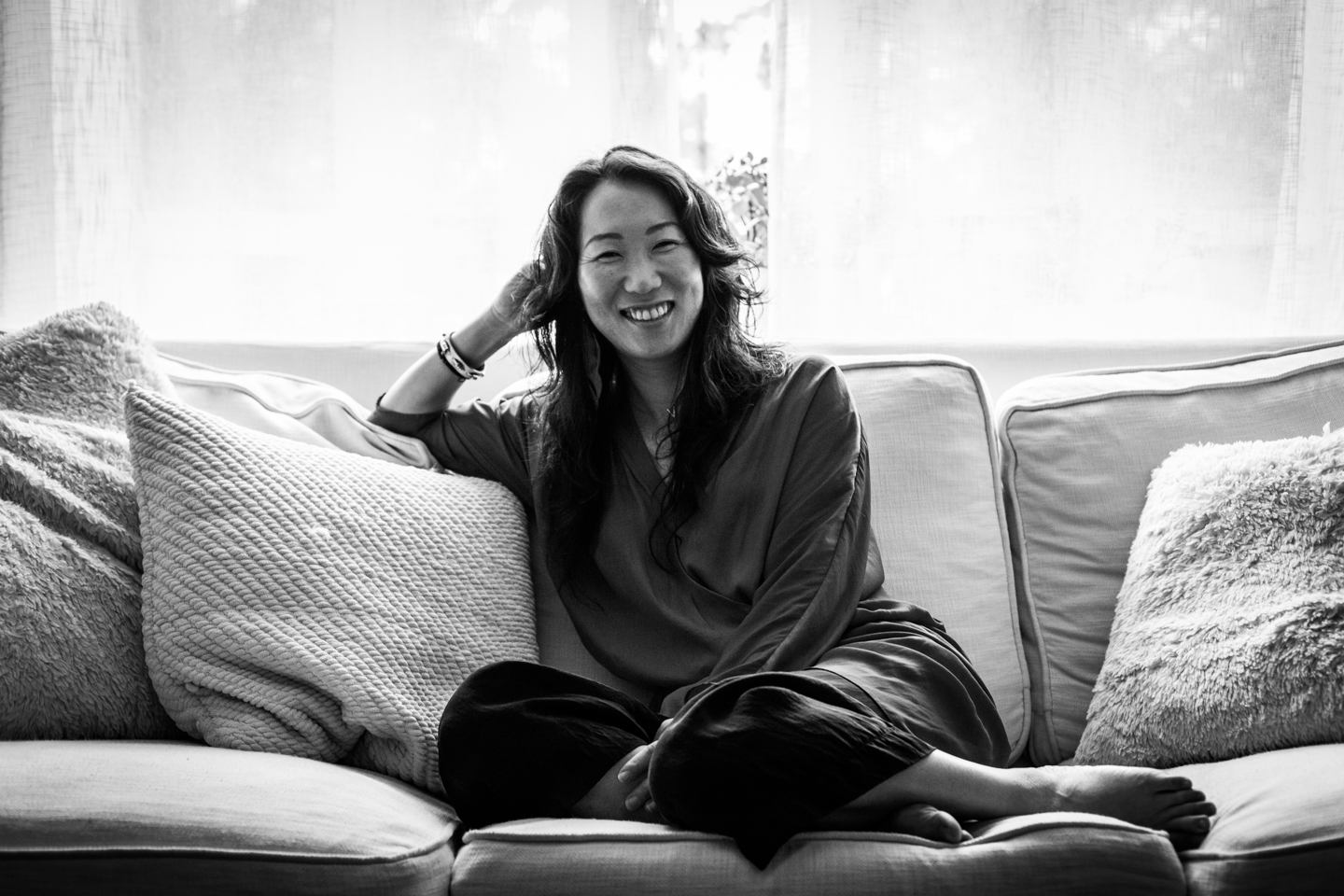
The script she developed, 37 Seconds, is the story of a young Japanese woman with cerebral palsy who dreams of being a manga artist but struggles with her family’s and outside world’s expectations. She hoped to inspire people to take a second look at the world around them.
“We could give in and live passively, or if you listen to your instinct and follow your heart, there’s always a road to a new world. Anything is possible That was a message I wanted to share for 37 Seconds.” The film went on to premiere at the Berlinale, receiving Panorama Audience Award and CICAE Art Cinema Award.
When it comes to advice for filmmakers who’d want to apply to the Screenwriting Lab, she said simply to find your own story. “Don’t judge yourself. Write what you know. Write what your heart tells you, what you want to share with the world.”
“If you have a goal, don’t think anything else… Live in the moment, as if you’ve already reached that goal. And no matter what other people say, don’t listen to it. Don’t even doubt yourself for a second, because the doubt is an energy that would pull you down,” she said.
“All you have to do is focus on that goal, your vision, and you’ll get there– and then the future will open up.”
Applications for the Film Independent Screenwriting Lab are now open. The deadline for non-Members is August 25th, while Film Independent Members have until September 8th.
Film Independent Artist Development promotes unique independent voices by helping filmmakers create and advance new work. To become a Member of Film Independent, just click here. To support us with a donation, click here.
Keep up with Film Independent…
How Project Involve Fellow Ante Cheng Brought an Indie Spirit to the Emmy Nominated Cinematography of ‘Pachinko’
It all started with a text from a friend that simply said ‘Congrats.’
“I was like, congrats for what?” recalled Ante Cheng. That’s how Cheng found out about his Emmy nomination for cinematography on AppleTV’s Pachinko. After it all sunk in, he recalled having some “happy tears.”
“It’s an honor to be recognized for the work my team and I have done. And Production Designer Ruth [Ammon] and her team was also nominated and recognized. It’s a great feeling”
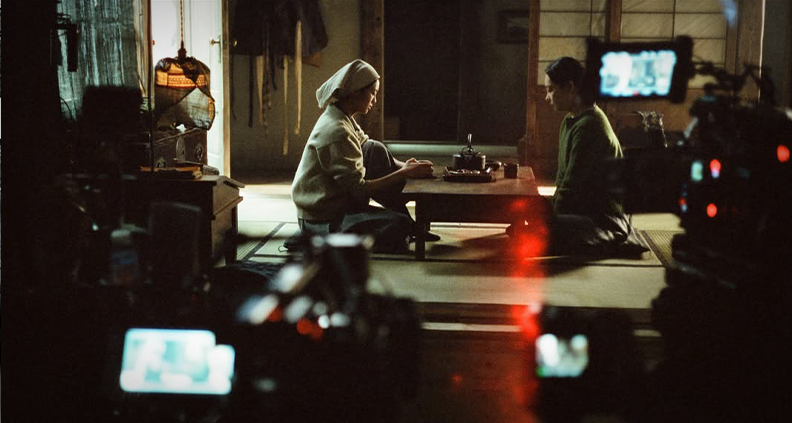
Cheng had a history of working on indie projects as a cinematographer, including many with Pachinko season one director Justin Chon, but moving to a prestige streaming series was a step up for him “to learn quickly and adapt how to work at a bigger scale.”
Despite working with a larger crew, bigger set builds and shooting multicam, Cheng and Chon wanted to stay true to their indie roots.
“We approached it like how we would in with our previous movies, which kept it nimble because it was a very ambitious schedule. We’re trying to get scenes in dusk or sunrise in a very short amount of time,” he said.
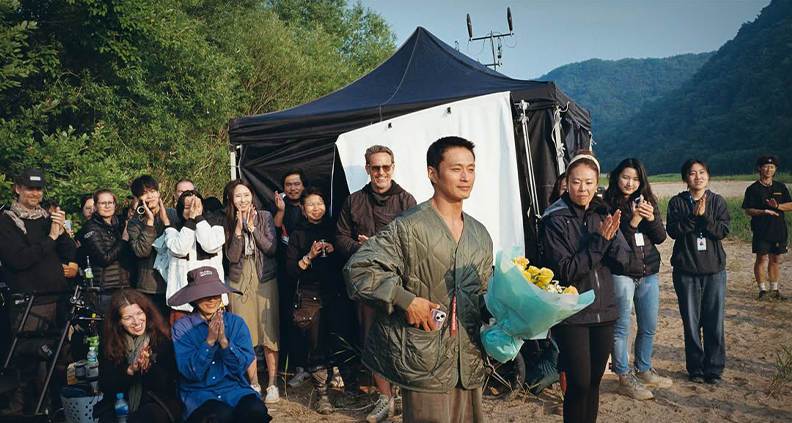
When he returned for season two, he had more large-scale projects like Marvel’s Ironheart miniseries and another Justin Chon collaboration, Jamojaya. “I think I’ve grown and both, you know, as a DP and as a person quite a bit during those two projects…. the characters have grown, matured and so Soo [Hugh, showrunner] and I really wanted to elevate and refine the work.”
Rather than use different color grades to show the different time periods the show portrays, the creative team chose to lens the eras differently. “In the 80s, the height of economic boom in Japan, we used really aggressively tuned anamorphic lenses from Panavision. And on the other hand, in the 40s, during World War II, I was working with Zero Optic to rehouse some of my favorite Leica M lenses from the era… and for the 50s post-war rebuild, Dan Sasaki at Panavision tuned the spherical VA lenses for us.”
When it came to format, the team also was inspired by Japanese tatami-rooms, whose architecture mirrors the proportions of tatami mats. “We also tested a few different aspect ratios and we found the 2:1 could be fitting. And it happens to be the aspect ratio of tatamis… the proportions would line up perfectly if you’re in 2:1,” he said. “All [season 2] is now set in Japan. So there was a lot of tatami mats.”
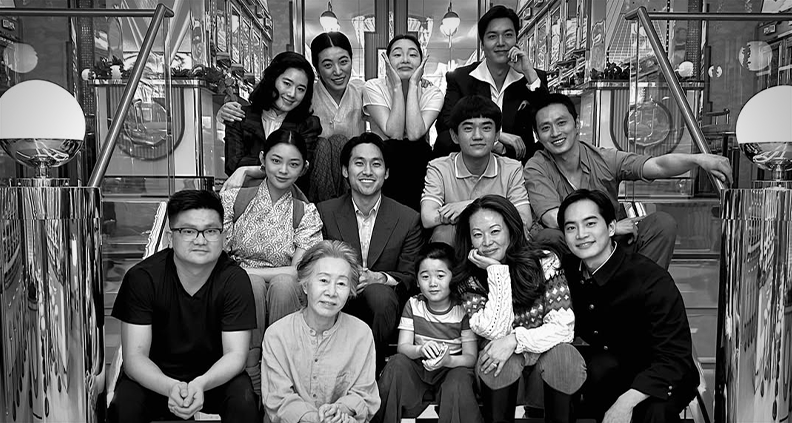
Cheng, a 2018 Project Involve alum, credits the program for helping him build his career as he came out of grad school. (Project Involve is still going strong, getting a record number of applications for its 2026 program.)
“It was the perfect program to go into. I think the best part was that you’re in a small group of other fellows that are in the same stage of their careers as you,” he said. “We can group together, make a short film and have the masterclasses and mentorship. They are all invaluable.”
The community that he found with his other fellows was just as important. He went on to make many projects with Project Involve alums including the feature Death of Nintendo in from writer producer Valerie Martinez.
Up next for Cheng is a collaboration with another Film Independent Fellow, Bing Liu, on his first narrative feature Preparation for the Next Life, coming out this fall.
Film Independent promotes unique independent voices by helping filmmakers create and advance new work. To become a Member of Film Independent, just click here. To support us with a donation, click here.
Photos via Ante Cheng
More Film Independent…
Our Fellows Advice on Applying to Fi Labs: Spotlight Your Story
“When I applied, I was very stuck.” said Naomi Iwamoto. “I was really looking for a cohort to give me fresh eyes and honest opinions on my script. The [Screenwriting] Lab helped me clarify what I wanted to say and the core of my story,” expanded Iwamoto, a writer-director, Film Independent Fellow, and guest speaker at last week’s Spotlight Your Story panel.
Hosted by Associate Director of Fiction Programs Dea Vazquez and Fiction Programs Manager Ashley Flores, the ‘Spotlight Your Story: Applying to Film Independent’s Artist Development Programs’ virtual information session featured an overview of the Screenwriting Lab and the Episodic Directing Intensive, informing prospective applicants on what to expect and how to make their applications stand out . Joining them were accomplished fellows Mary Dauterman (Fast Track 2023, Screenwriting Lab 2024, Episodic Directing Intensive 2025), Erin Lau (Project Involve 2021, Episodic Directing 2022), and Naomi Iwamoto (Screenwriting Lab 2024).
THE PROGRAMS
The Screenwriting Lab
The talk covered the Screenwriting Lab through which Film Independent selects six feature-length projects for this fully in-person two-week workshop. This Lab connects writers with creative advisors (an established writer or writer/director) and allows them to workshop their script and a 5-minute project pitch with a supportive group of fellows.
Film Independent is looking for bold stories told from an authentic point of view and a strong sense of voice, theme, and character. Writers can submit projects of all genres, and aside from a completed draft, the main requirement, Vazquez says, is that “This is the project that you really want to make. You can’t move forward as a film maker until you’ve made this project.”
Iwamoto, whose project revolved around a high school girl who loses her best friend and learns to love her mother, said the Lab impacted her script in infinite ways, helping her clarify what she wanted to say. The Lab “reminds you why you want to tell your specific story,” added Dauterman, who fondly recounted lunch breaks spent workshopping one another’s projects and how she felt reinvigorated with her project by the program’s end. The two also noted the Lab’s impact on their writing and scripts. While Iwamoto said, “You really need community to make your script better,” Dauterman lauded the advice from her story editor mentor, a connection she maintains to this day.
The Episodic Lab
The Episodic Directing Intensive is a three-day virtual program, consisting of panels with veteran TV directors, showrunners, executives, actors, and other crew members to prepare directors for a career in scripted episodic television. The program selects six directors with experience in fiction short films, fiction features, or commercial directing. Selected fellows become lifelong Fellows with year-round support from Film Independent.
“If you’re a visiting director or it’s not your show, you are fitting into a system that is already working,” says Dauterman, so “[getting] to talk to DPs and editors, talking to keys that would be your collaborators, was really interesting to learn what you can bring as a director and what can you learn and when should you listen.” And for Lau, learning how to take an interview, what expectations a showrunner has, and common mistakes for new directors, helped her when she directed her first episode: “I went back and looked at my notes before I had my interview for the show and when I was in prep.”
GRANTS
Applicants can also be considered for grants in both programs should they or their project qualify. The first is the Climate Entertainment Development Grant, a $25,000 grant developed by Plot Shift Media and Film Independent awarded to one filmmaker—accepted into the Screenwriting Lab or Fast Track Program—with a project elevating the climate crisis. $5,000 must be put toward packaging the project, and the grant committee will prioritize projects that “inspire feelings of possibility and agency when it comes to climate solutions, especially through characters and genres not traditionally associated with ‘climate stories.’”
Applicants for the Screenwriting Lab and the Episodic Directing Intensive can also apply to the Cayton Goldrich Family Foundation Fellowship, which provides $10,000 grants to two Jewish filmmakers accepted into any Artist Development Program, or the MPAC Hollywood Bureau Fellowship, which awards $10,000 grants to two Muslim-American filmmakers accepted into any Artist Development Program.
WHAT MAKES A STRONG APPLICATION
With hundreds of applications to each program, how can you ensure your application stands out? Vazquez and Flores emphasized the importance of the cover letter and artistic statement, where applicants can underscore why this project, this program, and why now as well as who they are and how they envision the project. They also emphasized the importance of professionality, copyediting, and utilizing all the real estate of the application to show readers who you are. When asked if a great script could be denied given a so-so application, Vazquez pitched in: “[The application] is a reflection of how seriously you’re going to take the program.”
The fellows also gave their advice on applying:
Dauterman: “It’s useful to say what you want help with. You’re applying to this program with a project you love, but you know it’s not perfect. If you can articulate, ‘Here’s what I think I would get out of the program,’ it will help you have clarity.”
Lau: “Being specific is really important, not only in telling your individual story but also in [answering] why this program. Really do your homework… You can tell when there’s a copy and paste answer versus how this specific program will benefit [someone] where they’re at.”
Iwamoto: “In application, you’re showing your ability to be a storyteller. Even when you’re talking about yourself, it’s an opportunity to show your storytelling skills.
WHEN TO APPLY
Both applications are now open. For the Screenwriting Lab, applications close on August 25, 2025, for Non-Members and September 8, 2025, for Members. For the Episodic Directing Intensive, applications are due for Non-Members on September 22, 2025, while the Member deadline is October 6, 2025.
More importantly, though, writers should apply for the Screenwriting Lab when they have “a script that [they’re] really passionate about and want guidance on,” says Iwamoto. The Lab is also great for those who have worked in TV or commercials and are now hoping to move to the feature world.
Directors should apply for the Episodic Directing Intensive after they’ve gained experience managing a large crew and have developed a strong body of work. Vazquez recommended 3-5 shorts but emphasized that all directorial fiction samples were welcome. While episodic samples are also welcome, this Intensive is mainly for those transitioning into the scripted episodic world. For example, Dauterman had done commercials and even made her first feature, but she was eager to dip her toe into the storytelling prowess of TV. Lau had been a PA for various TV shows but noted “it’s very elusive finding that entry point, and TV directing is its own artform. [The Intensive] was really really helpful.”
So, if you’re eager to collaborate with other talented filmmakers, take the next step with your script, or learn more about the film and television landscape, make sure to apply. These programs provide invaluable feedback and lifelong relationships, and, as Iwamoto noted, “Being a part of the bigger Film Independent family has been amazing; it really does feel like you’re a part of something bigger.”
Film Independent promotes unique independent voices by helping filmmakers create and advance new work. To become a Member of Film Independent, just click here. To support us with a donation, click here.
More Film Independent…
WATCH: Amplifier Fellow Contessa Gayles’s Powerful Music Doc ‘Songs From the Hole’ on Netflix
Songs From the Hole, which premieres today on Netflix, is rooted in music. It’s the story of James ‘JJ’88’ Jacobs, a Long Beach musician who, at age 15, took the life of a young man. Three days later, Jacobs and his family experienced their own tragedy when James’s brother Victor was murdered.
For his crime, Jacobs was sentenced to 40 years to life plus life. In the California prison system, he came to face what he did, and what happened to him. While in solitary confinement, he turned to music and wrote about his journey as a way to heal, share his story, and learn to live with the worst thing he’s ever done.
The film Songs From the Hole follows Jacobs, now in his 30s, as he and his family attempt to navigate the system to reduce his sentence. The film, directed by Film Independent Amplifier Fellow Contessa Gayles, tells the story through his music as JJ’88, with compelling and aethereal visuals. Each song shows a different side of Jacobs, like his despair and anger, his regret or his faith, and unveils a new part of the story.
“I hope that folks see in 88’s story and in his family’s story another offering for what we can do and how we can respond when violent harm happens, that the answer to violence doesn’t have to be more violence.” Gayles said. “Also on the systemic level, the answer to people causing harm does not have to be introducing more harm of incarceration.”
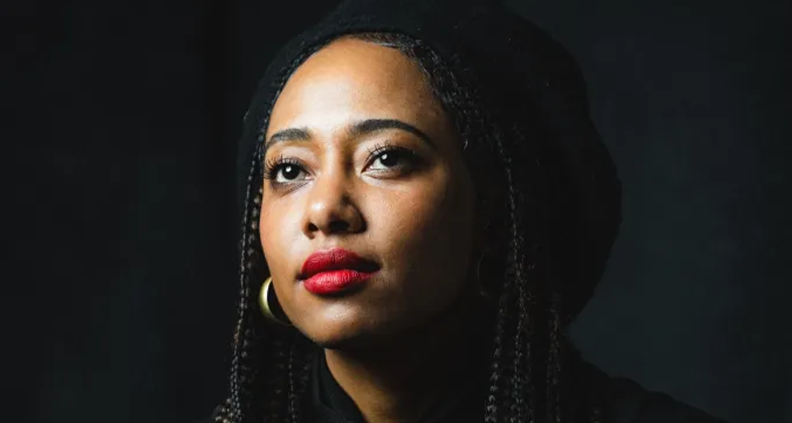
Photo by: Michael Ori
She came across Jacobs and his story while shooting her first feature film, the CNN produced The Feminist on Cellblock Y. Jacobs was a group member of the feminist self-help group led by another incarcerated man, richie reseda, who is now a producer on Songs From the Hole. “88 shared just a little bit of his story of meeting Jamaal [the man who killed his brother] and forgiving Jamaal and how transformative that was,” she said. “I saw how powerfully it resonated with those guys in that context.”
When the three decided to make a film together, Jacobs already had written treatments for music videos to go along with each song he wrote. He and Gayles went back and forth over the phone and in handwritten letters developing them and incorporating parts of Jacob’s life.
“During production, richie was taking screenshots of some of the dailies and sending them as printed out photos in the mail so 88 could see some of what was like physically manifesting on set from some of the things that he had wrote, which was powerful. Sometimes we could time it right where 88 could call while we were on set and he could just say ‘hi’ to the crew and the actors and interact for a little bit.”
Gayles, whose background is in documentary, saw shooting those music videos as an opportunity to grow creatively. “That’s his art, and he was putting it into my hands to interpret and bring to life in a lot of ways. And that really pushed me creatively to know that I didn’t want to let him down, knowing what a testimony it is,” she said.
“It was an opportunity to do something that felt culturally impactful because the art is so strong. I just didn’t want to disappoint.
“So I made the decision then, ‘let me bring my A game’.
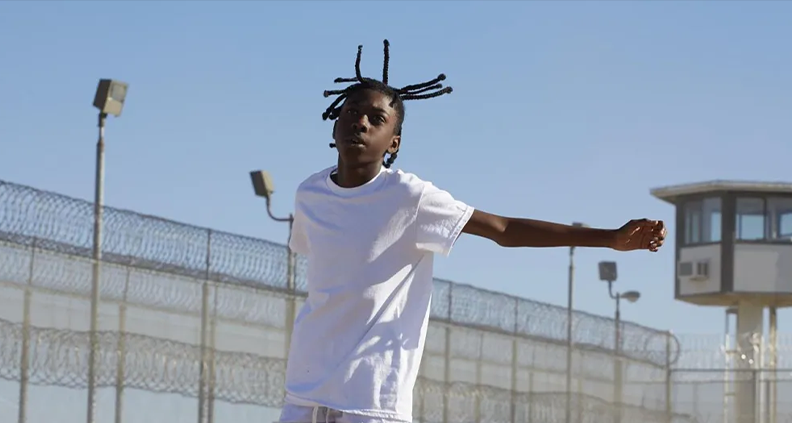
Gayles took Songs From the Hole through our inaugural Amplifier Fellowship which was sponsored by Netflix, so the film having its worldwide release on the streaming platform felt like a full-circle moment for her. She said how working with fellows who were working on narrative projects also sharpened the music video work. She also credited the mentorship for helping her career long-term. “Brenda Robinson came in as my mentor, and that was amazing. She’s been such a supporter of us in this film and me and my career.”Once the film was completed and making the rounds on the festival circuit, the team also started screening the film for prisons, jails, and child prisons. “Just to make our impact dollars really work for us, anywhere that we were already going for a film festival screening, we decided to plug in with a community partner and bring the film to directly impacted communities,” Gayles said. “So we did that basically in every city that we had a festival screening, and we did nearly 40 impact screenings outside of festival locations, as well.”
Beyond screening the film, there were live performances of the music, and guided discussion circles that covered healing and accountability.
“richie and 88 developed a more extended version of a curriculum that is more specific to using art as a tool for healing and artistic practice as a tool for healing, and that is available in California state prisons, along with the film and folks can watch the film, go through the curriculum and earn some time off their sentence for that,” she said.
In terms of what she hopes people take away, Gayles said “I made this film because I want to help people heal, and I believe this film and the way that we made it, and this story and the way we’ve told it, has the power to do that.”
Film Independent promotes unique independent voices by helping filmmakers create and advance new work. To become a Member of Film Independent, just click here. To support us with a donation, click here.
More Film Independent…
Meet the Bold New Voices of TV: Film Independent Announces the 2025 Episodic Lab Fellows
If you’ve ever tried to break into the world of writing for television, you know that it takes more than a great idea and some luck. It takes mentorship, guidance, industry connections — and yeah, still luck. If you already have your four-leafed clover, then Film Independent’s Episodic Lab has you covered for everything else.
This August, six talented writers will gather in Los Angeles for an intensive two-week program designed to help them refine their pilots and navigate the ever-changing television landscape.
Over the course of the program, they’ll receive personalized feedback from seasoned showrunners, creative producers, and executives, building the skills (and the relationships) needed to take their projects to the next level. This year Lab Creative Advisors and Guest Speakers include Christian Alvarez, KJ Booze, Wendy Calhoun, Sera Gamble, Emmeline Yang Hankins, Eric Heisserer, Anil Kurian, Marvin Lemus, Kyle Lau, Felischa Marye, Dani Melia, Caroline Mak, Marc Mounier, Adriana Nassar, Van B. Nguyen, Robbie Pickering, Erica Rosbe, Jasmine Russ, Eddie Quintana, Loretta Ramos, Gina Reyes, Beth Schacter and Ellen Shanman.
Netflix, the Lab’s Founding Sponsor, is back again to provide Fellows with unparalleled access to top executives and showrunners. And thanks to the Alfred P. Sloan Foundation, Fellow Lilian T. Mehrel will receive a $20,000 grant to support her pilot, Baddies, a romantic comedy set inside the world of a tech company making a dating app.
Amidst the changing landscape for television writers, we’re honored to have the opportunity to uplift such bold and innovative voices in the Episodic Lab,” said Dea Vazquez, Associate Director of Fiction Programs. “We’re thrilled to work with these writers in the program where we will nurture the development of their projects and careers and cannot wait to continue to support them as they progress forward in the television industry.”
The Lab will conclude with the Fellows pitching their work to studios and network executives, giving them and their projects a head start to get that illusive greenlight. Past Lab alums have gone on to write for shows like Fargo, The Morning Show, and Will Trent — proving the Lab is more than a workshop; it’s a launchpad.
Strap in as we meet this year’s Episodic Lab Fellows.
Meet the Fellows & Their Projects
Lilian T. Mehrel
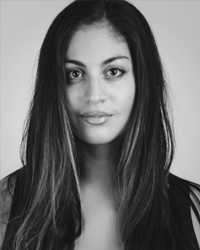
Lilian T. Mehrel is an award-winning writer & director with a visionary sense of feeling and humor. She won the Tribeca AT&T Untold Stories Award for her debut feature, Honeyjoon, which premiered at Tribeca. She was selected for the SFFILM Rainin Grant, TorinoFilmLab, CineQuaNonLab, Warner Media/TFI Co/Lab, and a Sony Pictures Classics / Marcie Bloom Fellowship. Her films have also premiered at Clermont-Ferrand and the American Pavilion Emerging Filmmaker Showcase at Cannes. She earned her MFA from NYU Tisch Grad Film with a PDS Fellowship, and her BA from Dartmouth with a Senior Fellowship.
Project: Baddies
A (romantic) comedy series about the team who works at Baddies — a dating app using behavioral science to undo their bad rap, beat the competition, oh and help people find love. If they can figure it out for themselves first.
Leah Sarbib
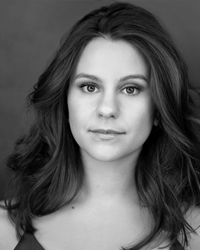
Leah Sarbib is an American and French Algerian writer based in New York. She has worked as a writers’ assistant on series including Super Pumped and The Morning Show, and was showrunners’ assistant on Billions. Her original play, Roadkill, premiered at the NY Fringe Festival. Sarbib began her career at the Tribeca Festival, where she created the audio department, produced podcasts including Tribeca Talks and Fierce (iHeart), and launched the audio festival Vertical (sponsored by Audible). She recently produced her fiction podcast, This Is Not A Love Story, and co-wrote her first feature.
Project: Cycle Four
In The Domain, where nobody dies or gives birth, Miriam’s visions prove to be memories of an erased past that can no longer be ignored.
Ida Yazdi

Ida Yazdi is an Iranian American filmmaker and former architect, raised between Isfahan, Iran and Birmingham, Alabama. She writes character-driven dramedies and dramas that explore identity, ambition, and family through morally complex characters. She’s an alum of the NBC TV Writers Program, the STARZ Writers’ Intensive, and the Women in Film Writing Fellowship. Her work was also featured on the2021–22 Muslim List created in partnership with the Black List. She was a writer on the NBC series Extended Family and has also worked on City on Fire (Apple TV+) and Girls on the Bus (HBO Max).
Project: Golden
A rebellious, young Iranian immigrant shakes off family traditions and becomes a sugar baby to the wealthy women of Tehrangeles. In a whirlwind of wealth, desire, and eccentric clients, he carves out his own path to the American Dream.
Bryce Cracknell

Bryce Cracknell is a writer, filmmaker, and journalist from North Carolina based in Los Angeles. As a storyteller, Cracknell seeks to elevate narratives, histories, and experiences that are overlooked, cast aside, or forgotten. He was a Staff Writer on Season 6 of CBS procedural FBI: Most Wanted and is in production on his directorial debut, a hybrid-documentary on climate justice, produced by Effie T. Brown. He is a graduate of Duke University where he earned a B.A. in Public Policy and was a member of the 2024 NBC TV Writers Program.
Project: Lacuna
A haunted soldier is conscripted into a secret mission inside the Lacuna, a surreal, perilous realm where myths are real, time is unstable, and his past awaits.
Spencer Jamison

Spencer Jamison is a Richmond, VA native whose work is rooted in care, curiosity, and community. She holds an MFA in Acting from the Yale School of Drama and a BA in Musical Theatre from James Madison University. Jamison writes ensemble-driven narratives across genres, centering the humor, depth, and complexity of Black womanhood. She is currently developing her debut feature, an expansion of her audience award–winning romantic comedy short At Capacity. She is a 2025 WIF Writer Fellow, a member of the inaugural Broadway Advocacy Coalition Artivism Fellowship cohort and is immensely grateful to be supported by Film Independent.
Project: Subpar
After a public meltdown, a disgraced LPGA golfer returns home, where coaching her half-sister’s struggling golf team may be her only shot at redemption.
Rom Lotan
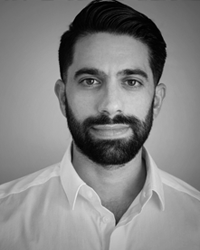
Rom Lotan served for a decade in Israeli intelligence and later worked in the tech scene between Tel-Aviv and the States, before pursuing writing. Most recently, Lotan ran the writers’ room for his new show for BBC Studios and Amazon UK. Lotan has developed with Chris Brancato at MGM, 20th Television, The Ink Factory, eOne, and more. He staffed on an AMC spy show and is a Sundance Episodic Lab Fellow. Lotan holds an MFA from USC’s Stark Program, an MA in International Relations, and a BSc in Computer Science. He is represented by IAG, Writ Large, and LGNA.
Project: Zer0 Trust
When high-powered companies are hacked and every second costs millions, elite cybersecurity expert Amelia Hayes and her response team are called in to contain the breach. However, the most dangerous vulnerabilities aren’t in the code- they’re in people’s blind spots.
Film Independent promotes unique independent voices by helping filmmakers create and advance new work. To become a Member of Film Independent, just click here. To support us with a donation, click here.
Keep up with Film Independent…
Member Lens: Casting Director & Spirit Award Winner Nicole Arbusto
Our ongoing Member Lens feature spotlights current Film Independent Members to see how they got started, where they are now and what being part of Film Independent means to them. This month: Casting Director Nicole Arbusto.
***
Nicole Arbusto loved theater & studied acting, but realized quickly that acting wasn’t for her. Still determined to be in the drama business, she worked at a theater in New York where she was introduced to casting. It was a perfect fit for someone who loved the art of acting and actors.
Throughout the years she’s worked in TV and film and fostered a relationship with director Azazel Jacobs, that started with 2011’s Terri, and most recently His Three Daughters (2024) which won her and her cast the Robert Altman Award at this year’s Independent Spirit Awards.
We spoke with her earlier this month about the award, the importance of casting smaller roles, and why she loves to share her experiences with the Film Independent community.
Let’s start with your background. Where are you from, and what drew you to film in the first place?
I’m from New York originally, and I got interested in casting when I was working at a theater in New York. When I started working in casting, I originally worked at a studio for a casting director named Wally Nicita who worked only in film. So it happened naturally
And how did you get the theater bug?
I was a theater major in college and started out I had done some acting in high school and a little bit in college I realized pretty quickly that I didn’t want to be an actor, and I couldn’t really figure out where I would fit in that world. After college I was working in a literary department at a theater, and it was during the summer when it was pretty quiet in the lit department, but they did do a lot of play readings. And I ended up talking to the casting director a lot about who was going to be in the readings and how that process worked, and how did he decide on who was going to be in the readings, and that’s how I got interested.
And then when did you first become aware of Film Independent?
Oh, gosh. I mean, definitely 20 years ago or so.
When Josh passed, I was trying to think of how long I had known Josh for, and I definitely found emails from him from 2005. So a long time.
And how did you first come across Film Independent? Was it through Josh or through something else?
I’m not sure how I initially became a member, to be honest.
I’ve been a member for a really long time, and I think in the early days, I was just going to screenings and going to events, and I think Josh was the first person that reached out and asked me to either do a panel or help with Project Involve, casting somebody’s short.
You’ve done so much work with us, from working with Project Involved to even last year when you were on a panel with us. What appeals to you about fostering a new generation of filmmakers?
Well, I just think that, like any industry, there’s a little bit of gatekeeping, and I think anything you can do to sort of demystify that is important. When I first started in the business, the way I met my first boss and got my first job in casting with Wally Nicita was through somebody who knew somebody who knew her. You know, it’s those kinds of relationships that kind of give you your start.
And meeting other people in the business and having the freedom to ask them questions or how things work, that’s how you learn. There are certain things you’re going to learn in school or in college, but other things, they’re a little bit immutable and you’re going to kind of learn them from being able to ask somebody in the business questions.
Yeah, and you’re right. It’s great that people like you are willing to reach out and help people with that. So thank you.
I’d love to ask you a couple questions about your Spirit Award-winning film, His Three Daughters. What was it like getting that cast together?
Well, I think in the process with His Three Daughters was very different from other films that I’ve worked on with Azazel Jacobs. Because this was the first film that we worked on together where he wrote the parts specifically for those three women. So it wasn’t a traditional casting process for the leads. It was always going to be those three women and that’s it.
So luckily there were already relationships in place, basically, with each of them. That was more about just getting them the script and seeing if they responded and then working out sort of the timing for three busy actresses.
Tell me what it felt like when you heard that you won the Spirit Award because obviously the Altman Award is one of the few awards out there for casting, so it’s unique in that way.
Well, it was just incredibly surprising and I think the thing that’s so nice about the Altman Award, it’s a great honor, but I love that it includes an ensemble because even with a film like His Three Daughters with a really small cast, for me, it’s the supporting roles really impact a film and those are always the parts that I really enjoy casting the most.
When I go to see a film, I’m always looking at the person that played the waiter or the person that played the teacher, the roles that really create the world of the film. Even with something like His Three Daughters where you’re really inside most of the film, we spent a fair amount of time casting the role of Victor (played by Jose Febus), the building manager who only interacts with Natasha, who’s always smoking pot outside on the building property. I think a part like that becomes really important because he’s one of the only people you see on the streets of New York. So, a part like that becomes really important because he’s representative of the city and of the other inhabitants of the building.
So what was great about winning The Altman is to have really everybody included. Especially since, you know, filmmaking is such a collaborative effort.
Absolutely.
What is one of your favorite parts about being a Film Independent member?
Well, I love going to the screenings and hearing the Q&As after. The last one I went to was for Don’t Let’s Go to the Dogs Tonight, and it’s a really interesting film with incredible performances, especially from the young girl who plays the youngest daughter.
But it was fascinating to hear Embeth Davidtz talk about her process, especially since I know her so well as an actress, and to hear her talk about her work as a director and her connection to the material and how she developed it and working with actors. It’s just great to have that kind of insight into a process.
That’s great. Thank you so much. I really enjoyed speaking with you today.
Film Independent promotes unique independent voices by helping filmmakers create and advance new work. To become a Member of Film Independent, just click here. To support us with a donation, click here.
More Film Independent…
Don’t Miss Indies: What to Watch in August
It’s time to get real in the August edition of Don’t Miss Indies, with three of our selections featuring non-professional actors in pursuit of authenticity. Whether it’s the New Zealand choir kids in Tinā, the Guinean cyclist delivering lunch to Parisians in Souleymane’s Story or badass Badlands ranchers in East of Wall, these films wrap a story around the humans onscreen, touching on everything they embody in life. Let’s watch it.
SOULEYMANE’S STORY
When You Can Watch: August 1
Where You Can Watch: Theaters (Limited)
Director: Boris Lojkine
Stars: Abou Sangare, Alpha Oumar Sow, Nina Meurisse
Why We’re Excited: As a Guinean immigrant (first-timer Abou Sangare) cycles frantically through the streets of Paris on various food delivery jobs, he prepares for a crucial immigration asylum interview. The challenges he encounters along the way are inspired by interviews that French filmmaker Boris Lojkine (Camille, Hope) and casting director Aline Dalbis (Camille) conducted with Paris food delivery workers. Their experiences with scams, finding places to stay, and navigating the asylum process all help shape “a political fable with all the grit and urgency of a thriller,” according to Rory O’Connor, The Film Stage. To heighten the authenticity of these real-life experiences, Lojkine cast non-professional actors, tailoring the script around their natural movements and speech patterns.
SKETCH
When You Can Watch: August 6
Where You Can Watch: Theaters (Limited)
Director: Seth Worley
Stars: Tony Hale, D’Arcy Carden, Bianca Belle
Why We’re Excited: What do you do when your kid’s drawings come to life – and not in a sweet, charming way? This is the plight of single dad Taylor (Emmy winner Tony Hale, Veep) when his daughter Amber (Bianca Belle, Lady in the Lake) exorcises her painful feelings via monster sketches that then begin terrorizing the whole town. In an ambitious swing for his first feature, Seth Worley mixes kids, stunts and animation for a whimsical approach to grief that blends “the wide-eyed wonder of a Steven Spielberg, the impish mischief of a Joe Dante, plus the vibrant visuals of prime Pixar,” as Michael Rechtschaffen puts it in his THR review.
EAST OF WALL
When You Can Watch: August 6
Where You Can Watch: Film Independent Presents
Director: Kate Beecroft
Stars: Porshia Zimiga, Tabatha Zimiga, Scoot McNairy
Why We’re Excited: In Kate Beecroft’s first feature, newcomers Tabatha and Porshia Zimiga star in a fictionalized version of their own lives, lending a sense of realism to the South Dakota ranch film. The story follows new widow Tabatha through financial problems as she rescues horses in the Badlands while also offering shelter to teenagers looking for a fresh start. East of Wall won the Audience Award in the Next section at Sundance, and promises to be a completely fresh take on the spirit of the American west. Beecroft met Zimiga while driving through Colorado, Nebraska and South Dakota in search of fascinating faces and compelling people. Looks like she got what she came for. Executive Produced by Film Independent members Alex Engemann and Ryan Hawkins.
MY MOTHER’S WEDDING
When You Can Watch: August 8
Where You Can Watch: Theaters (Limited)
Director: Kristin Scott Thomas
Stars: Scarlett Johansson, Sienna Miller, Emily Beecham
Why We’re Excited: In her directorial debut, BAFTA Award winner Kristin Scott Thomas (Four Weddings and a Funeral) plays the titular “mother” – in a story she created to explore her own childhood loss of two fathers. This film follows the aftermath of widowhood and orphanhood as Diana (Thomas) prepares for her third wedding, instigating a family reunion and some unwelcome trips down memory lane. Thomas explains the compound losses that inspired the screenplay in an interview with Lee Cowan, CBSNews. “I know that a lot of the time when I was a younger woman, I had this feeling of something missing, this piece of my puzzle missing having grown up with only one parent.” Exploring how that puzzle shapes her three fictional daughters (which include Spirit nominees Scarlett Johansson and Sienna Miller) offers an opportunity for all four women to face the future with fresh eyes.Edited by Film Independent member Joan Sobel.
SPLITSVILLE
When You Can Watch: August 18
Where You Can Watch: Film Independent Presents
Director: Michael Angelo Covino
Stars: Dakota Johnson, Adria Arjona, Kyle Marvin
Why We’re Excited: In this second collaboration by Spirit Award nominated writing team Michael Angelo Covino and Kyle Marvin (The Climb), the two star as friends Paul and Carey. Carey’s wife Ashley (Adria Arjona, Father of the Bride) has just asked for a divorce, while Paul’s wife Julie (Dakota Johnson, Spirit Award-winning Suspiria) comes on to Carey because Paul and Carey have an open marriage – the secret to true happiness. Except that it isn’t, apparently. At least not in this movie. “The goal was to make something wildly entertaining and emotionally honest,” says Covino in an interview with The Hollywood Reporter. “Something that feels familiar in the setup but constantly surprises in the execution.” As Carey tries to adopt the “anything goes” philosophy he thinks Paul is advocating, it cracks open the pretense for both friends to face reality.Produced by Film Independent members Jason Wald (EP), Jennifer Westin (EP), and Jeff Deutchman (Producer).
RELAY
When You Can Watch: August 22
Where You Can Watch: Theaters
Director: David Mackenzie
Stars: Riz Ahmed, Lily James, Sam Worthington
Why We’re Excited: Communication is the theme of this psychological thriller that plays with the medium of message relay through third party services, connecting strangers Sarah (Lily James, Cinderella) and a nameless world-class fixer (Riz Ahmed, Sound of Metal) in a way that is equally protective and disconcerting. Ahmed’s character breaks his own rules to help this new client, a whistleblower seeking protection, but the blowback from her powerful enemies knocks everyone off their game. A far cry from any of his previous films in theme and genre, David Mackenzie (Hell or High Water) explains to IndieWire, “I’m always interested in outsider characters, and Riz’s character is a pretty extreme outsider character.”
THE TOXIC AVENGER
When You Can Watch: August 29
Where You Can Watch: Theaters (Limited)
Director: Macon Blair
Stars: Peter Dinklage, Jacob Tremblay, Taylour Paige
Why We’re Excited: Spirit Award nominee Peter Dinklage (Game of Thrones) leads this crowd-pleaser remake of the 1984 toxic accident comedy directed by Macon Blair (I Don’t Feel at Home in This World Anymore), except instead of a nerdy kid trying to get dates, Winston is having a hard time connecting with his son (Jacob Tremblay, Room). As a janitor for an evil corporation, his toxic transformation equips him with superhuman strength and a glowing mop. To save his son, Winston has to go up against the gloriously power-hungry Bob Garbinger (Spirit Award nominee Kevin Bacon, The Woodsman) and all that corporate greed represents. “I think the best way to approach certain serious topics is through satire and comedy,” says Dinklage in SuperHeroHype, “and [Macon] nails it every time.”
TINĀ
When You Can Watch: August 29
Where You Can Watch: Theaters
Director: Miki Magasiva
Stars: Anapela Polataivao, Antonia Robinson, Beulah Koale
Why We’re Excited: New Zealand choir teacher Mareta (Anapela Polataivao, Our Flag Means Death) is grieving the sudden loss of her daughter while contending with uppity attitudes from students and leadership at her new school. But the music sees her through. Director Miki Magasiva explains to Dale Husband at E-Tangata, “All the kids that we used in the film are choir kids. None of them were actors … What I had to do was connect the story to what they were doing, and tell them how we were connecting the songs to the story that I was trying to tell. And once I did that, I had full buy-in emotionally from them.”
TWINLESS
When You Can Watch: August 27
Where You Can Watch: Film Independent Presents
Director: James Sweeney
Stars: Dylan O’Brien, Lauren Graham, Arkira Chantaratananond
Why We’re Excited: This is a dark comedy about two men whose twin brothers have died, which played at Tribeca and premiered at Sundance. As Roman (Dylan O’Brien, Teen Wolf) forms an earnest bromance with Dennis (writer and director James Sweeney, who also wrote, directed and starred in Spirit Award nominee Straight Up), it seems their friendship could be headed for something more, but secrets emerge – early reviews are hush-hush to avoid spoiling the details, but apparently it’s all very bold, surprising and twisty. Though IndieWire’s David Ehrlich is kind enough to hint, “that story makes a sharp and shrewdly executed swerve away from Apatow and towards Almodóvar or De Palma.” Sounds like fun.
PROGRAMMER’S PICK: IT’S NEVER OVER, JEFF BUCKLEY
When You Can Watch: August 8
Where You Can Watch: Theaters (Limited)
Director: Amy Berg
Stars: Jeff Buckley Mary Guibert, Ben Harper
Why We’re Excited:From Senior Programmer Jenn Wilson: For die-hard Jeff Buckley fans, Amy Berg’s documentary on the enigmatic young musician has been a long-time coming. That’s because the musician died in a drowning accident at only age 30 in between making his first and second albums and never got the chance to reach the zenith of his career. As such, fans never got to know much about Buckley’s life. Known for his show-stopping vocals and live performances, the movie blesses us with footage from several live performances including ones from Sin-é Café where Buckley worked and first started to take the stage and make his name as a singer. The movie also finally fills out the missing details of his life, his estrangement from his dad (folk singer Tim Buckley) and his extremely close relationship with his mom whom he cherished. Blessed with a vocal range that spanned four octaves, Buckley literally had the voice of an angel, and this film matches the sweet and gentle tones of his voice and too-short life.Produced by Film Independent members Jennifer Westin (Executive Producer), Jenna Cedicci (Co-Producer) and filmed by Jenna Rosher, Cinematographer.
KEY
![]()
Film Independent Fellow or Member
![]()
Film Independent Presents Screening, Q&A
![]()
Microbudget
![]()
Filmmaker or Lead Characters of Color
![]()
Film Independent Spirit Award Winner or Nominee
![]()
Female Filmmaker
![]()
LGBT Filmmaker or Lead LGBT Characters
![]()
First-time Filmmaker
![]()
LA Film Festival Winner or Nominee
For over 40 years, Film Independent has helped filmmakers get their projects made and seen. The nonprofit organization’s core mission is to champion creative independence in visual storytelling in all its forms, and to foster a culture of inclusion. We support a global community of artists and audiences who embody diversity, innovation, curiosity and uniqueness of vision. To support our mission with a donation, click here.
Keep up with Film Independent…
FiSpo Spotlight: How Friendships Shape Us
Welcome to Fiscal Spotlight, a special monthly round up of projects—at all stages of production—working their way through Film Independent’s Fiscal Sponsorship pipeline. Enjoy!
***
Some of our most treasured memories as we come into adulthood are times with our friends. They can be laughing till midnight about nonsense or being there when family doesn’t understand.
Friendship is most strongly felt as we emerge from the expectations put on us from the outside world. That can be at adolescence, or a turning point in our life later. It’s where we model our identity outside of the family. It’s a training ground for becoming the ‘you’ that you want to become. That’s why so many classic coming-of-age stories are about friendship (Stand By Me, Swingers, Booksmarts etc).
As we grow, we find how to become ourselves within our families, and we create our own. The life-and-death feeling fades, but we still need our friends. Mature friendships keep us sane, keep us honest, and help us to continue to grow.
This month’s Fiscal Sponsorship projects all deal with friendships at these pivitol stages, whether it’s the deep friendship that’s tested when new options and opportunities arise like in Salt the Fields, or the unlikely friendship of disparate youth in a dangerous world that forces them together as in Tribe. There’s also a friendship that I think most Film Independent readers can relate to, finding your people at the movies like in Popcorn Prophets.
Keep reading to learn more, including how you can support these projects.
TRIBE
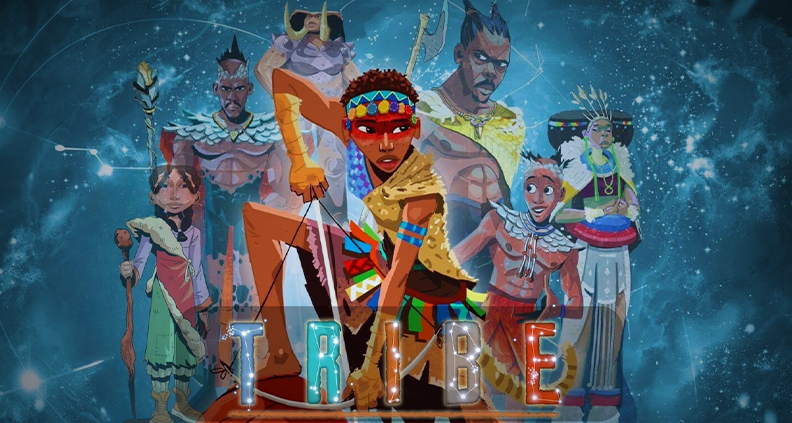
Project type: Animation
Project status: Development
Writer/Director/Executive Producer: Tendayi Nyeke
Producer: Kaydee de Villiers
About the Project: When Timba, an overlooked and restless servant’s rare ability to unlock magic in others is discovered, she must find the courage to do what she most fears: be vulnerable, lean on unlikely companions, and defy powerful people intent on exploiting her gift.
Meet the Filmmaker: Annie Award-winning and Children’s Emmy-nominated producer Tendayi Nyeke has over 15 years of experience in live-action writing, directing, and producing, which has earned her global recognition. She became a development executive at Emmy-winning Triggerfish Animation, where she led story development for shorts, series, and features in collaboration with international partners.
SALT THE FIELDS
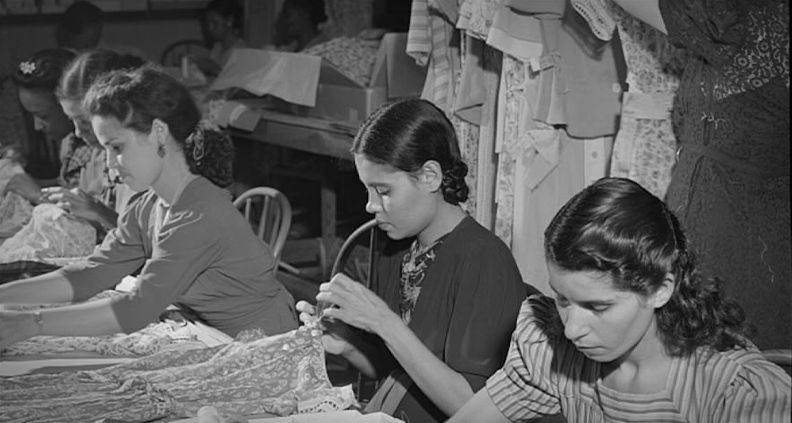
Project type: Fiction Short
Project status: Development
Writer/Director: Zoe Salicrup Junco
Producer: Quetzali Lopez
About the Project: Two inseparable best friends dream of a way out of a world that offers them little choice. But when a birth control pill program arrives at their factory, the choices they make for freedom threaten to destroy their bond, and their futures. Inspired by the real and illegal contraceptive trials in 1950s Puerto Rico.
Meet the Filmmaker: Born and raised in Puerto Rico, Zoé is an award-winning director, writer, and producer. A graduate of NYU Tisch (BFA, Film & TV) and Columbia University (MFA, Screenwriting & Directing), she crafts stories that defy Latino clichés, replace tropes with truth, and reimagine characters with purpose and emotional weight. Her short film Marisol won the HuffPost Social Impact Award and was acquired by HBO, with other narrative work screening at Tribeca, Palm Springs, Clermont-Ferrand, Urbanworld, and the HBO NY Latino Film Festival.
POPCORN PROPHETS
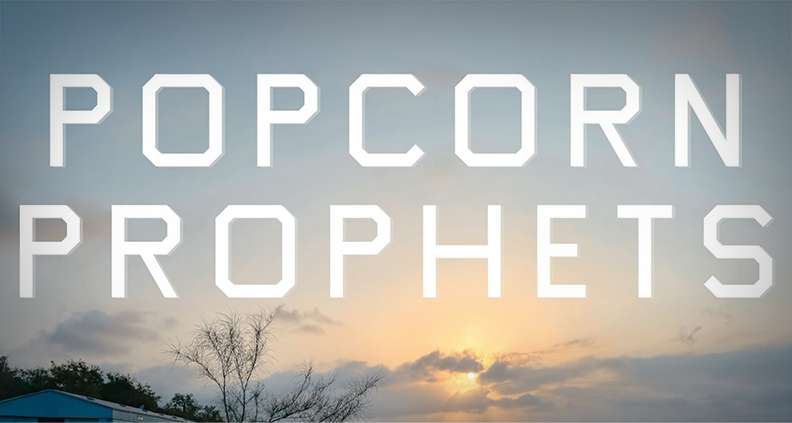
Project type: Fiction Feature
Project status: Development
Writer/Producer: Reynaldo Leal
About the Project: Jonah’s mother finds salvation in religion. He finds it at the movies. In 1990s South Texas, a grieving teen skips church each Sunday to chase his own piece of cinema heaven.
Meet the Filmmaker: Reynaldo Leal is a South Texas-based writer and Marine Corps veteran. He served with the 3rd Battalion, 5th Marines during Operation Phantom Fury in Fallujah and was awarded the Bronze Star with “V” device for valor. After his military service, he earned degrees in Environmental Science and Mass Communications from the University of Texas Rio Grande Valley. His screenwriting has received national recognition. His script A Band of Wolves was featured on the annual 2024 Black List. He is also a 2023 Slamdance Screenwriting Competition finalist and a 2024 WGA Veterans Writing Project mentee. Popcorn Prophets is his first feature film and is personal, inspired by his own experiences growing up in the Rio Grande Valley after the loss of his father. Through this story, he honors the quiet resilience of working-class families and the healing power of cinema.
Learn more about Fiscal Sponsorship, including its benefits and eligibility requirements by visiting our website. See which projects are currently being supported via our Sponsored Projects page.
Film Independent Artist Development promotes unique independent voices by helping filmmakers create and advance new work. To support our work with a donation, please click here. Become a Member of Film Independent here.
Keep up with Film Independent…
Beyond Screens: How Podcasts and Social Media are Democratizing Science Storytelling
In this ever-evolving digital age where a plethora of information—accurate and inaccurate—continues to be added and trafficked, it can be an overwhelming space to explore for both creators and viewers. It can also be an incredibly rewarding space, so is the case in the rich cyber world of science. At the 2025 Sloan Film Summit, the triennial collaborative art-science event between Film independent and the Alfred P. Sloan Foundation, we had the privilege of gathering some of the most accomplished and up-in-coming science communicators for the New Media Panel, where they shared some of their personal experiences and insights related to contemporary science communication. Moderated by Ali Vanderkruyk, the panelists included: Emily Graslie (The Brain Scoop), Dr. Kiki Sanford (This Week in Science), Lindsay Nikole (Zoology Science Communicator), Latif Nasser (Radiolab), and Isaias Hernandez (Queer Brown Vegan).
On what drew them to science communication on digital platforms rather than more traditional media—academic journals, traditional science, etc.—for Graslie and Hernandez, representation was a huge factor that motivated them to get into the online science community. “I got into science because I didn’t see any women on YouTube,” Graslie said, “I might not be the best, but I’m going to show up first.” She was someone who went against the grain—studied for a fine arts degree rather than a science degree. Regardless, she and her support system believed in amplifying the natural curiosity and valuable knowledge of a non-scientist, seeing as a majority of people are not scientists themselves. Through The Brain Scoop, she “became a conduit for the audience.” Hernandez recalled not seeing anyone in the world of science who reflected him growing up, someone Brown and of the LGBTQ+ identity. While studying environmental science in college, he admitted to not being able to name at least “five Indigenous environmentalists” or “five Latino environmentalists,” which he viewed as a red flag. This motivated him to perform his absolute best, because he believed in the value of his lived experience represented in the world of science. Back in Tumblr’s heyday, he had a private blog where he talked about spirituality, climate, and education, and kept his identity anonymous until a friend inspired (or well-intentionally forced) him to create a public account. Queer Brown Vegan was the result. Also, science educators who positioned themselves as strict authoritative figures were all too common for him. It was important for Hernandez to “talk about environmentalism through a working-class lens.” This aspect in his approach helped him navigate how to “use communication not as a tool for authority, but rather empowerment.”
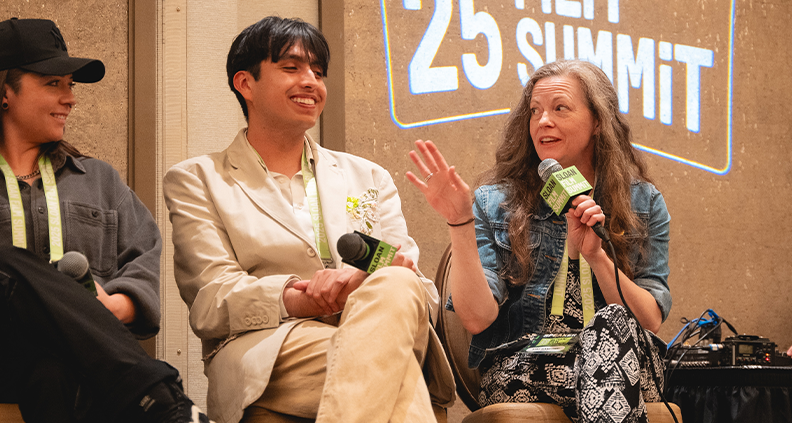
Dr. Sanford was also creating videos on YouTube, but not in the same way as Graslie or other creators. Instead, she found her footing in “podcasting before podcasting was podcasting.” She started This Week in Science as a college radio show, motivated by the very minimal science coverage on college radio at the time. “I was recording the show on cassette tape, and then technology advanced”—MP3 recorders, minidisks, etc. Then, in the early 2000s, she uploaded her MP3s on her website. Soon people started downloading and subscribing by the numbers, and Apple’s introduction of iPods and the podcast feature was almost heaven sent. “Suddenly I was talking to people around the world,” she said, “it became this really amazing opportunity…to be able to actually have this voice that was beyond terrestrial radio.” These new avenues of mass communication widened the door for quick, accessible, and unlimited topics of discussion. One of her biggest career takeaways is being able to adapt to new technologies, something we’ll no doubt continue to see more of.
Fresh out of college during the COVID-19 pandemic, Nikole lived with her parents and happily shared all the facts she learned in school. “Can you tell somebody else?” she recalled her parents joking, and in fact she did on the short-form social media platform TikTok. “It was really cool to just be able to upload a video from my room talking about everything that I learned in college, and reach an audience of any varying size.” She quickly noticed that people were more interested in “freaky creatures that went viral” over complex concepts. In response, Nikole gained a following by creating content based on what people were looking for. She later made her way to the long-form platform YouTube, where she was able to expand on the content that gained attention on TikTok.
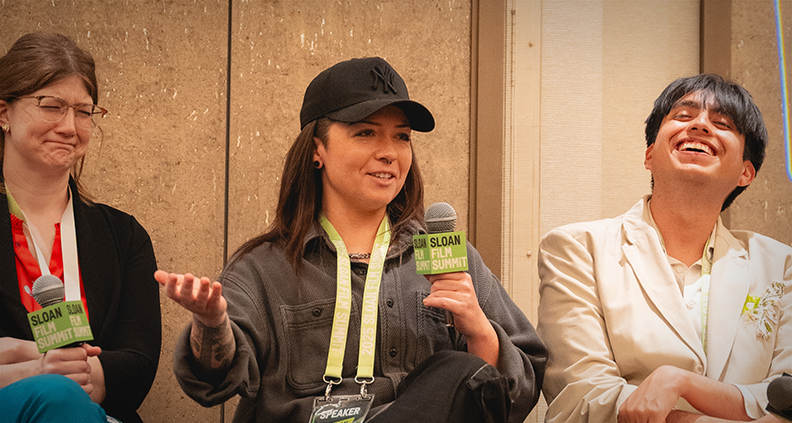
Latif Nasser initially studied to become a playwright, but was “too timid” and went to grad school where he took a course on the history of science. “All the people in my grad student program—the professors and students—acted like they already knew this stuff and it wasn’t that interesting,” adding to his frustration, “how is it so obvious and boring to you, and not obvious and—if you frame it right—not boring to other people.” He pursued one of the traditional ways of science communication through writing scholarly articles, only to be constantly rejected from publications. “I wasn’t following the format or I wanted to keep in a stupid joke or whatever it was,” he said, pointing to the restrictions of traditional science communication; professional and formal over personal and casual. Radiolab was one of the first podcast’s he ever heard, and connected with its format—“it’s funny and it’s dumb, but it’s smart.” After much trial and error, he made his way to the podcast that suited his scientific approach, and thank goodness for that. “I felt intellectually constipated,” he said, which is probably more relatable than we want it to be.
In discussing how social media helps develop a conversation around complex topics that may be overlooked in mainstream science education, Instagram gave Hernandez a place to write out all his thoughts piece by piece. He was seeing science communicators discuss interesting concepts that were accessible to him as a college graduate in science, but noticed a missing “cultural component.” Terms and meanings truly aren’t enough to understand the functioning and impact of any given thing. “I can’t just talk about these…terminologies that are coming from academia,” for example something like petro-masculinity; the study of socially-supported patriarchal power to the fossil fuel industry and its harmful effects. He believes that approaching science communication in this way has the ability to inspire greater empathy in people for each other and the planet, and the intimate-like atmosphere between the viewer and social media already exists to help achieve these greater goals. “We can’t save one another without each other.”
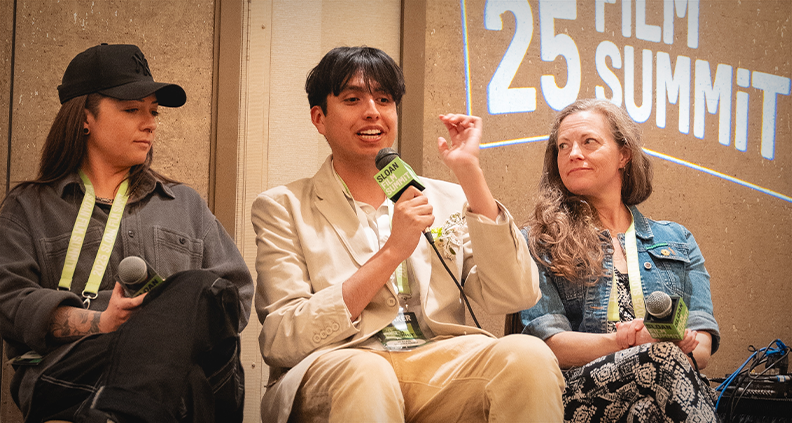
Lindsay approaches her content by positioning herself as a friend, learning with the viewer as she goes along. Through a friendly disposition when educating or communicating, people can learn new things without shame of not already knowing. Additionally, she considers long-form content as a great format for being able to say “I’m not really sure about how I’m telling you this information right now…but you can make your own opinion based on what I just presented to you.” This attitude is difficult for her to navigate in short-form content, but when done right one of this format’s perks is the ability to deliver the main message simply and immediately. It’s no secret that digital media today seems to cater towards short-attention spans, which is why TikTok and YouTube Shorts continue to grow in popularity. Nevertheless, long-form and short-form content offer variety for different audiences to enjoy.
Dr. Sanford leads her podcast with conversation rather than attention-grabbing antics—it’s embedded in the conversation itself. She and her co-hosts each hold their own expertise, and the show’s format is mindful of the audience through engagement practices. “Part of the process of what we do is rooted in the studies, the methods, the results, but the conversation is all about the questions,” adding, “we want to be a credible source of information, but we also want to be the radio DJ for science!” She affirms that serious conversations are had and absolutely should be, but there should be room for humor and levity; examples of which have even existed before social media (Bill Nye the Science Guy just entered the chat). Nasser gleefully expresses how spontaneous theories and hypotheticals are embraced on his show. Although he thinks it’s perfectly fine “to do the scientifically accurate thing” and accept the facts about whatever topic as they are, he conquers that it’s a lot more interesting and exciting to imagine the what-ifs; “It’s so de-centering to imagine the world from a bird’s eye view.” Radiolab’s sound design greatly adds to the experience, with original composers creating captivating sounds to compliment each episode. All of these factors—the science, the levity, the sounds—which may seem like an unlikely bunch on paper can indeed work well together and be equally educational.
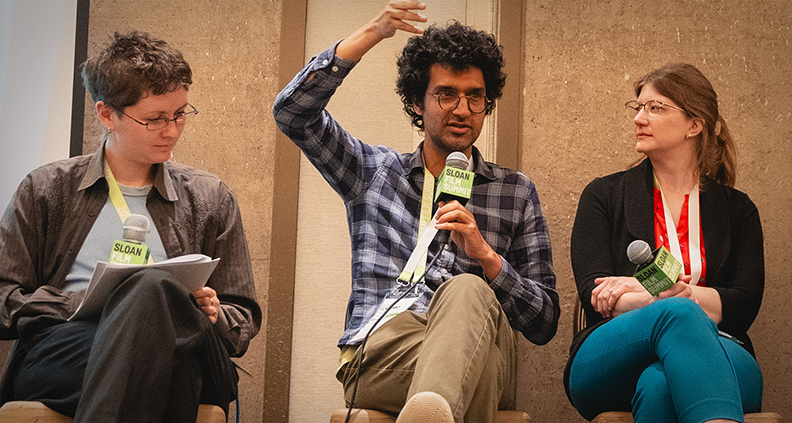
Then, there’s the relationship between traditional scientific authorities and independent creators. A topic that Graslie knows all too well. Shortly after launching The Brain Scoop, Chicago’s Field Museum “snatched her up to get her before anyone else could.” She recalled her recruitment happening during a transitioning period within the museum between “old guard and new guard.” It was primarily the younger staff and women who advocated for her involvement and supported her work. As a young painter-turned-YouTuber, Graslie was viewed outside the mold of an acceptable science museum staff member by senior staff and curators. Tasked with communicating the museum’s information through contemporary media, the tension between “old guard and new guard” was felt. These adjustments weren’t easy for everyone, but proved to be positively impactful. By the end of her contract with the museum, the show she poured into wholeheartedly belonged to them, leaving her no choice but to have to start a new project from scratch. “It was like a reset,” she said. Then, in 2023, a fan of her work inspired her to again try to obtain the show rights. Coincidently, a marketing head who actively refused to let Graslie have the show was let go. Simultaneously, there was a new hire in the museum’s legal team who sympathized with her case, and helped her acquire the rights to the show within a few months. “I got my credibility back.”
The digital science communication sphere, like other spheres in the digital space, is consistently reshaping and competing. With plenty of science communicators producing content, of varying backgrounds and formats, algorithmic content competition becomes a tricky thing to navigate. It’s one of those things that no passionate science communicator necessarily wants to deal with, but many do in the goal of reaching an audience and the benefits that come with that. Algorithms are obstacles that creators navigate at their own pace. Dr. Sanford chooses to ignore the algorithms. “Every time I’ve tried to focus on those aspects of creating…it’s taken away from the conversation and what I actually want to do.” So, she happily marches to the beat of her own drum. In response, Graslie stresses the value of having a team—even if it’s small—where each person can better focus on their part of the project, because creating can be quite “soul-sucking” as an independent creator. It can be exhausting having to build a project and simultaneously reach an audience on many platforms out there. That’s why for some creators locking in on one or two is the best way to go. It’s about “how your skill set can be applied to the best outlet.”
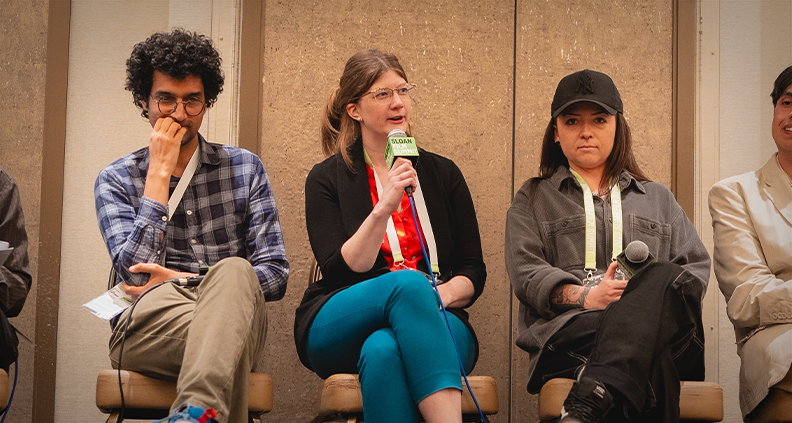
On the current state of contemporary science communication, Hernandez has observed a rise in corporations rewarding “pretty privilege” in the next generation of science communicators. “The amount of pretty privilege you need to have in this space now where brands are…going to put you in Vogue…and make you the next public figure luminair,” as he put it, is problematic behavior in its attention to the superficial and the imperious messages that it sends. “We’re in a new world that’s measuring us not just on how well we can speak and how much we know,” he goes on to say. Good-looks and attractive aesthetics could then be viewed as developing additional invisible requirements for aspiring science communicators. However, it’s safe to say that we still live in a society that values substantial science over sexy scientists.
Graslie would like to see more museum content out there. “I want to see every museum collection,” and in order for that to happen there has to be a better infrastructure in place to support the creators who would like to make that possible. Dr. Sanford addressed the increased interest in unpacking science as it’s been primarily constructed through a colonial lens. “It’s still an old man’s club,” she said. The panelists would love to continue to see support for independent creators and collectives, a near-urgent call stemming from an increasingly lack of federal and organizational financial support. “We as a media landscape are really losing to so much misinformation and disinformation,” lamented Hernandez. False information is a self-explanatory disservice to all. As Graslie passionately put it, the new media panelists remain optimistic that the public won’t “undermine the critical value that [they] have with [their] platforms.” New media science communicators are not traditional science educators, and that’s the idea. Perhaps an argument is to be made about how this current science communication ought to be packaged and delivered, but there’s no question that the presence of science in the Digital Age is valuable. Luckily, we have educated and creative people such as these nurturing that space.
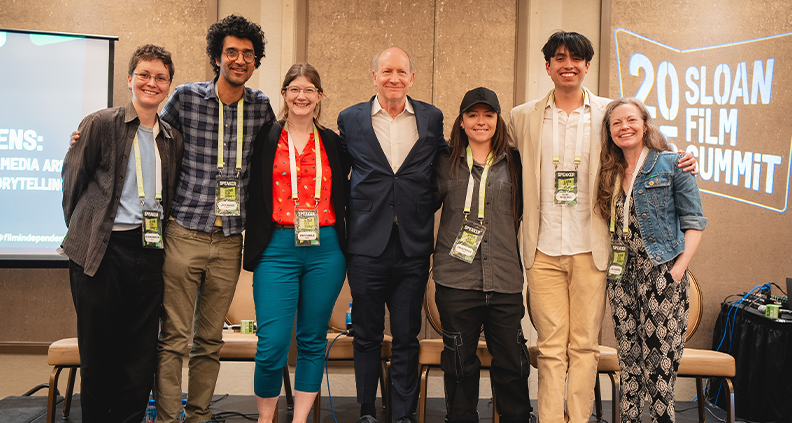
Where to find them:
Emily Graslie (The Brain Scoop): YouTube
Dr. Kiki Sanford (This Week in Science): Apple Podcasts, YouTube, Spotify
Lindsay Nikole (Zoology Science Communicator): Instagram, TikTok, YouTube
Latif Nasser (Radiolab): Apple Podcasts, Instagram, Spotify, YouTube
Isaias Hernandez (Queer Brown Vegan): Instagram, TikTok, YouTube
The Sloan Film Summit, launched in 1999, is part of Sloan’s greater efforts through its Public Understanding of Science and Technology initiative. Celebrating eight iterations, this year’s Summit (the fourth consecutive one produced by Film Independent) is a celebration of the program’s wide-ranging success supporting emerging filmmakers, while also bringing together a new group of artists and scientists to highlight how art and science interact and collaborate.
We’re thrilled to celebrate the arts and sciences with inspiring minds in both fields.
For over 40 years, Film Independent has helped filmmakers get their projects made and seen. The nonprofit organization’s core mission is to champion creative independence in visual storytelling in all its forms, and to foster a culture of inclusion. We support a global community of artists and audiences who embody diversity, innovation, curiosity and uniqueness of vision. To support our mission with a donation, click here.
Keep up with Film Independent…
Presenting Film Independent’s Future Filmmakers Class of 2025
“Look around you, you may find in your peers your collaborators.” These are the words of advice award-winning writer and director Amman Abbasi gave during his keynote at the annual Future Filmmaker Showcase at Inner City Arts in DTLA. This past Friday, July 18th, Film Independent’s Education Programs premiered 13 short films written, directed and produced by some of the most talented and insightful high schoolers you’d ever meet. The students also took the opportunity to heed Amman’s advice and network with themselves alongside some industry professionals over lunch.
Get to know the 2025 class and their shorts below, including what inspired them to make movies, their favorite genres, directors, and where they shine best during the filmmaking process.
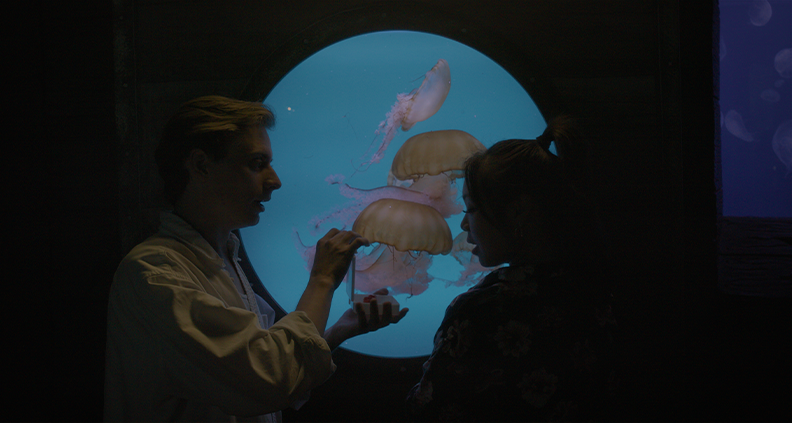
-Bummer Ending directed by Gabriella Marinace-Lee
What inspired you to make films?
“Honestly, I didn’t always know I wanted to make movies (which is so not a good story), but I’ve always loved psycho-analyzing people and creating characters! As a kid, I was always playing pretend with my stuffed animals and editing things together in iMovie. My love of film really developed during my time in high school, thanks to my amazing teachers and peers. It’s my favorite way to tell a story and connect to people.” – Gabriella Marinace Lee, “Bummer Ending”
“I was inspired to pursue filmmaking when I was just four years old. I remember seeing one of my father’s DVDs lying around; it was Jurassic Park. Watching it felt like being pulled into another world. That immersive experience stuck with me, and it’s continued to inspire me ever since.” – Natthawee, “Addolorarsi”
“I was inspired to make the film after watching 80s slasher after 80s slasher last spring, paired with my obsession for 80s new wave music and the script practically wrote itself! I’ve always loved the 80s, from the film’s to the fashion to the music, and I wanted to make a film to pay homage to that whilst still maintaining the progress we’ve made as a society; I wanted a diverse cast, a strong female lead and to include that dry, witty British humour I’ve grown up with. The film is special to me because it’s the first time I’ve properly been able to play with my artistic choices and storytelling techniques.” – Kevwe Ayigbe, “Camp Carnage”
“I’m a huge reader. Like all book-nerds, I grew up daydreaming about my favorite books being turned into movies. After watching behind the scenes documentaries and interviews of The Princess Bride and other book to screen adaptations, I realized that the best way to adapt my favorite books and short stories was to make them myself!” – Katerina Carlson, “Loneliness”
“Films like Harry Potter showed me how the creativity and imagination of filmmakers can bring magic to life on screen, inspiring me to create art that encourages viewers to open their minds to the endless storytelling and worldbuilding possibilities. Researching how films were made and how certain shots and effects were achieved also inspired me to explore working behind the camera and expand my knowledge on the filmmaking process.” – Lilly O’Brien, “Long Shot”
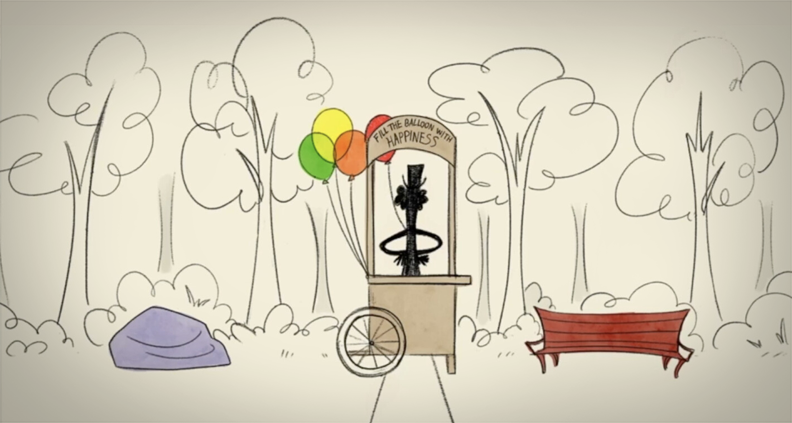
Balloon of Happiness directed by Ryu Sihyun
“I believe the greatest charm of cinema lies in allowing people to experience different worlds and feel a wide range of emotions. Especially with animation, there’s limitless room for imagination. Creating stories within that imaginative space and making people happy is what truly inspires me to make films. Through stories based on my own life, I hope to evoke shared memories and move people’s hearts. The fact that I can influence the world—even just a little—through the art I’m capable of, is what drives me to keep creating animation.” – Ryu Sihyun, “Balloon of Happiness”
“Consuming and enjoying art of all media, especially music, watching how other people express ideas with beauty inspired me to make films. In the making of this project in particular, the filmmaking process has been a breath of fresh air and a way to alchemise a complex idea into a precise, confined unit.” – Alex Brown, “Language of the Universe”
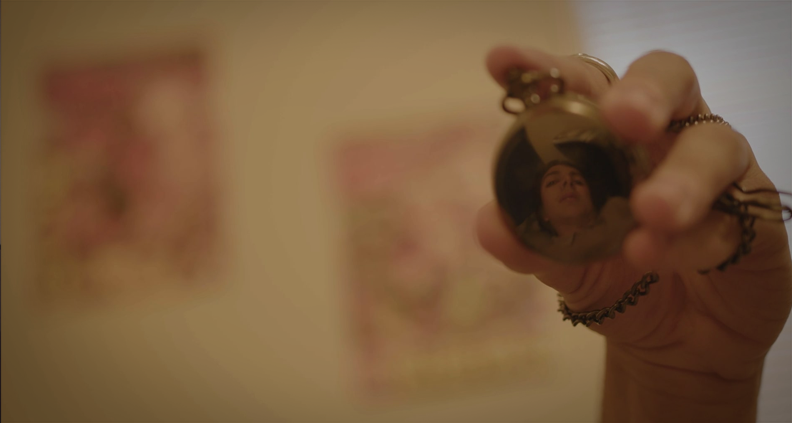
The Bet directed by Bardia Seiri
What is your favorite film genre and why?
“I’m drawn to dark comedies and psychological dramas. I like when films reflect reality but twist it in a way that makes you think, laugh, or both.” – Bardia Seiri, “The Bet”
“My favorite genre is drama, because human emotion is endlessly fascinating to me. I believe many of us don’t fully understand our own emotions, myself included. But when I make films, it’s like I’m going on a journey alongside the story. It shapes me. The process helps me reflect, grow, and connect more deeply with myself.” – Natthawee
“I have always gravitated towards science fiction. I grew up watching The Twilight Zone, and my favorite book will forever be Frankenstein. The majority of the films I’ve written and directed the past few years have been or have had elements of sci-fi, even if that wasn’t my original intention. I love this genre because I find it so beautiful that humans find such magical and creative ways to mirror the human experience and express human emotions. Life is so big that sometimes we need to look outside our world to figure out how we feel about what’s happening inside our world.” – Natalie Yerelekian, “How It Should Be”
“I love film, so it’s hard to pick just one genre. I will say, I’m partial to a good British comedy (think Shaun of the Dead), there’s something so comforting about them to me and they never fail to make me laugh. I’m also a huge superhero film fan, in fact it was Guardians of the Galaxy Vol. 2 that pushed me to pursue a career in film and TV.” – Kevwe Ayigbe
“I’d have to say my favorite film genre is stop motion and puppetry! I love Coraline and Del Toro’s Pinocchio, I’ve rewatched them on repeat for years.” – Katerina Carlson
“Documentary because it is a window to a new reality to share and learn.” – Magnus Shipe
“I love drama, mystery, dystopian, and psychological horror films. I usually take inspiration from my own experiences, fears, or interests while adding a twist that usually falls into these genres. I love creating nuanced, thought-provoking, and relatable characters and stories.” – Lilly O’Brien
“I don’t particularly prefer one genre over another, but I tend to enjoy films that make me feel happy. Being able to experience a moment of joy through film, even amidst the pressures of reality, is one of the reasons I love cinema so much.” – Ryu Sihyun
“I tend to gravitate toward either grounded dramas or artful, near-surrealist works. These genres represent two sides of what art does for me: observing the world as it is, and imagining the world as it could be.” – Alex Brown
“This is so hard, I love so many genres and so many movies from various genres. I will say though my favorite movies are ones with happy endings.” – Gabriella Marinace Lee

Addolorarsi directed by Natthawee
What’s the best film you’ve seen so far, old or new?
“One of the best films I’ve ever seen so far is a new film called The Boy and The Heron. The film to me felt both surreal but human, touching me to my core. The film explores the creator’s life and accepting loss so subtly, and shows that nothing can last forever and nothing is perfect as they seem It’s one of my inspirations to continue making art because I aim to make film that is both deeply personal and captivating.” – Natthawee
“The best film I’ve seen so far is La La Land. I’ve probably watched it over 10 times at this point, and I will never get tired of it. I feel it truly captures the magic and love for the film industry and art related careers. Even with all the troubles the characters faced while chasing after their dreams, they never gave up. This has always been such an inspiration for me and made me feel so connected to the film.” – Natalie Yerelekian
“The best film I’ve seen has got to be Back to the Future. It’s a classic for a reason, and I watched it so many times it’s practically etched into my brain. The fact that it’s transcended so many generations is just a testament to how great it is. It’s the perfect blend of sci-fi and comedy, and the outfits? Obsessed! (Special shout out to What We Do in the Shadows, it’s probably my favourite piece of vampire media ever!)” – Kevwe Ayigbe
“The best film I’ve ever seen? That’s a really hard question to answer, there’s so many to choose from! I have to say the best movies I’ve seen in theaters is a toss up between Across the Spiderverse and Sinners— both had me on the edge of my seat! Spiderverse’s visuals astounded me and Sinners’ music and composition stuck with me for days. I adored both. I love how both films took these classic stories and legends and was able to turn them into something new.” – Katerina Carlson
“The best film is Incident at Oglala because it taught a new world.” – Magnus Shipe
“Get Out is one of the best films I’ve seen because of the countless layers of analysis and deeply explored themes throughout the film.” – Lilly O’Brien
“There are so many great films, but one that recently stood out to me again is Amélie. It’s truly one of the best films I’ve seen. Beyond its visual beauty, the charming young girl at the heart of the story, and her perspective on love, make the entire experience utterly enchanting.” – Ryu Sihyun
“Spirited Away, Chungking Express, and Pulp Fiction are all contenders. I hope to continue to watch more films in the future to deepen my understanding of the film language.” – Alex Brown
“I really really loved Everything Everywhere all at Once and I was so happy it won the Best Picture Oscar! To me, it was the perfect mix of emotional, impactful and whimsical, a true masterpiece!” – Gabriella Marinace Lee
“La La Land is probably the film that’s stuck with me the most. It’s emotional, visually stunning, and every element feels intentional.” – Bardia Seiri
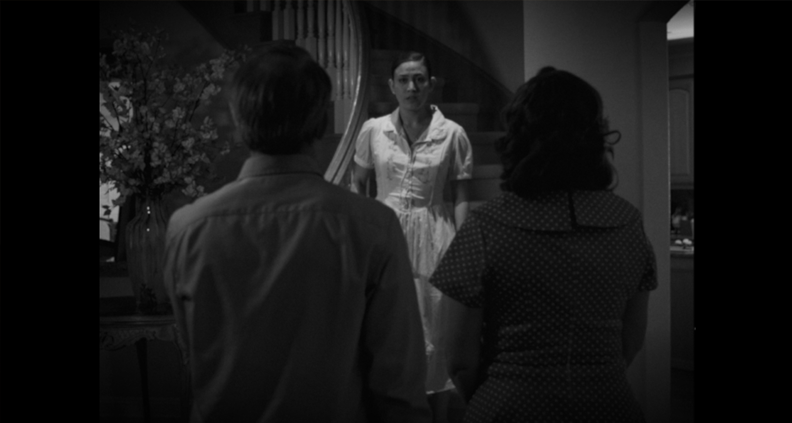
How It Should Be directed by Natalie Yerelekian
What’s your favorite part of the filmmaking process?
“My favorite part of the filmmaking process is being on set. For “How It Should Be”, after spending months working on writing the script, finding locations, casting actors, creating overheads and shotlists, and all the other stuff that goes into pre-production.Iit was such an incredible experience to see this story that had once been just an idea in my mind become reality. Hearing and seeing the lines I wrote acted out in real time just reminded me why I love filmmaking so much. A small idea in my head turned into something others can watch and connect to.” – Natalie Yerelekian
“My favourite part of the film making process is being on set. I love the electric energy of it all, working alongside my team and feeling like I’m creating something that matters!” – Kevwe Ayigbe
“My favorite part of the filmmaking process has to be either writing a first draft or editing the final cut. I love new beginnings, when your mind is bursting with ideas, but I also love color grading that last piece of footage, finally seeing all your hard work pay off.” – Katerina Carlson
“There are many aspects of filming I love. I built the computer I made the film on, met a new family, and learned more about my heritage.” – Magnus Shipe
“I love being involved in every aspect of the filmmaking process, but one of my favorite parts is filming on set after actors have had enough time to deeply understand and feel comfortable experimenting with their characters. I love being with the majority of my crew, too, because these moments are the most collaborative, memorable, and fun.” Lilly O’Brien
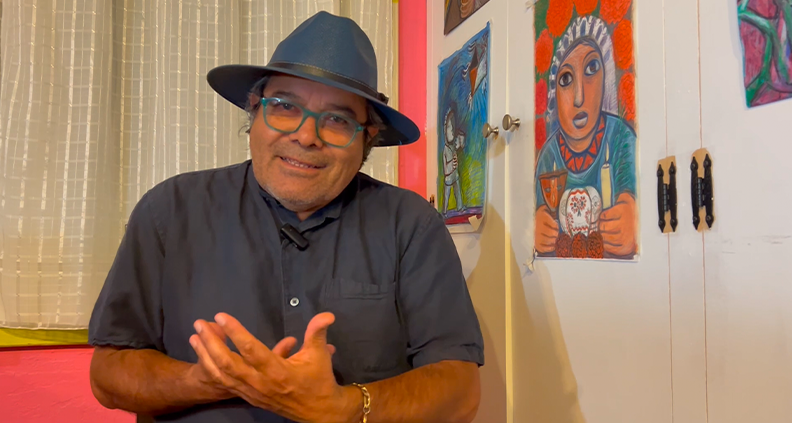
From the Heart directed by Eliana Dukes
“Definitely the storyboarding phase. It’s when I get to imagine the final piece and build the framework of an entire world in my mind. That process excites me the most—it’s when I feel most thrilled and energized.” – Ryu Sihyun
“Definitely cinematography. I find that the cinematographer has the most power to influence the feel of a film.” – Alex Brown
“I adore developing characters and then trying to fit them into stories. Overall, I just love writing scripts.” – Gabriella Marinace Lee
“Directing. It’s where everything comes together. The script, the visuals, the performances. I love the challenge of shaping something intangible into something that hits.” – Bardia Seiri
“My favorite part of the filmmaking process is editing. It’s my favorite stage. It’s the moment where everything finally comes together. To me, it’s even more important than the shoot, because no matter how beautiful the footage is, poor editing can destroy a film’s emotional impact. But with the right cuts, rhythm, and silence, even if you have half-baked footage, you can transform raw material into something meaningful.” – Natthawee
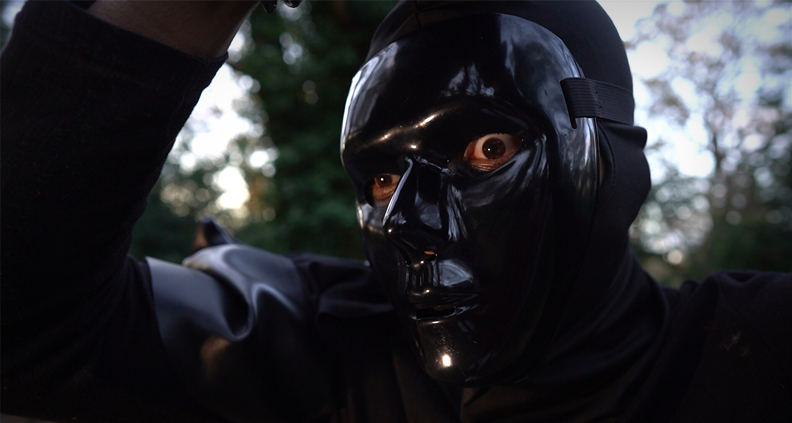
Camp Carnage directed by Kevwe Ayigbe and Hari Coles
Who is a director who inspires you?
“I take a huge inspiration from both Martin Scorsese and Taika Waititi, both very different directors but both have made some of my favourite films of all time. I love how distinct their styles are and how much they stand out from the sea of films we now have. They inspire me to really look inside myself as a creative and figure out what it really is that I want to portray in my work.” – Kevwe Ayigbe
“So many directors inspire me, but I’d have to say the top three are Rob Reiner, Greta Gerwig, and Jim Henson.” – Katerina Carlson
“I am inspired by other young directors like the students who tell their stories.” – Magnus Shipe
“Jordan Peele inspires me because of the originality and passion he puts into every film.” – Lilly O’Brien
“Paul Thomas Anderson (PTA) and Pete Docter from Pixar. Every time I watch a PTA film, I’m amazed by how he tells such diverse stories across genres, yet his unique style and wit are always present. Pete Docter also inspires me deeply—his imagination comes to life beautifully in films like Inside Out and Soul, and his storytelling has a lasting emotional impact.” – Ryu Sihyun
“The ease with which Wong Kar Wai breaks convention to share feelings of romance, despair, and absurdity with the audience in a very intimate way inspires me. I’m planning to apply some of his cinematographic and storytelling techniques in future projects.” – Alex Brown
“The first project I did was an homage to Wes Anderson and I do really like him as a director. I know he gets a lot of criticism for being overly stylistic and his movies all “looking the same” but I appreciate that he always does his own thing, I hope to always be proud and content doing my own thing.” – Gabriella Marinace Lee
“Damien Chazelle. His attention to rhythm, pacing, and emotional build-up is unmatched to me.” – Bardia Seiri
“A director that inspires me is Michael Goorjian. His film, Amerikasti, is the story of a young Armenian boy who escapes the Armenian Genocide by fleeing to the United States, but when he returns as an adult, he is arrested. From the prison, he watches Armenian families to learn more about his Armenian heritage. This film so beautifully captures Armenian culture and values and what it means to be an Armenian for audiences of all nationalities. This summer, I attended a two week workshop taught by Mr. Gorrjian with the Armenian Film Society. I learned so much from it and was so incredibly inspired.” – Natalie Yerelekian
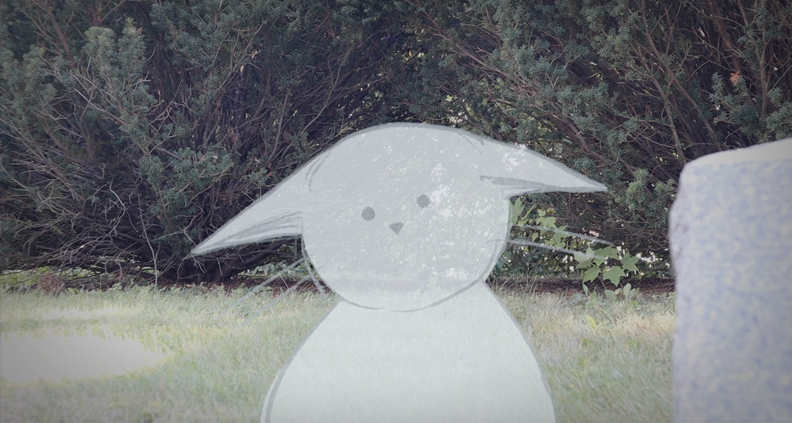
Loneliness directed by Katerina Carlson
Which actors would you love to work with?
“Admittedly, my dream cast and crew would be The Muppets. Working with Kermit and Miss Piggy would be a dream come true.” – Katerina Carlson
“I’d love to work with more Native American actors and shows like New Mexico’s, Dark Winds.” – Magnus Shipe
“I don’t have a specific actor that I would want to work with, but I’d love to work with anyone who is passionate, supportive, dedicated, and eager to collaborate by sharing their own creativity and ideas to add to their character.” – Lilly O’Brien
“I would love to work with Jim Carrey. His vibrant energy and ability to embody such a wide range of characters are incredible. Just the idea of working with someone like him sparks countless creative ideas in my mind.” – Ryu Sihyun
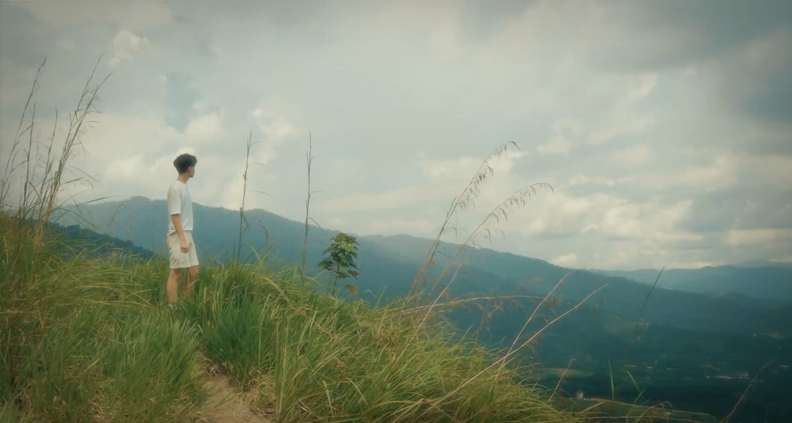
Language of The Universe directed by Alex Brown
“I actually really enjoy working with the actors that I have right now; my fellow film students in high school. There is something pure and authentic about working with people who are motivated to better themselves and the project and are doing it purely for passion and not pay.” – Alex Brown
I love Succession and I think they have one of the best casts of all time. I would love to work with Kieran Culkin or Jeremy Strong. Another favorite of mine is Challengers and working with anyone on that cast would be amazing but especially Zendaya, she’s so talented. – Gabriella Marinace Lee
“Jeremy Allen White and Ayo Edebiri. They both bring something raw, grounded, and unpredictable to their roles.” – Bardia Seiri
“I would love to work with Brad Pitt. His on-screen charisma and acting range always amaze me. He has this rare ability to be completely himself while also disappearing into his characters. He’s one of the most interesting actors working today.” – Natthawee
“My dream would be to work with any of the cast from the show Severance. Severance is my absolute favorite show, and everyone who knows me knows that. The cast is so incredibly talented, creative, and inspiring. They capture such complicated emotions and heavy topics effortlessly. I hope one day I can create something as impactful as this show with a cast with even a fraction of their talent.” – Natalie Yerelekian
“Two actors I’d love to work with would be Florence Pugh and Dave Bautista. I have huge respect for them both and am constantly in awe of their performances, not to mention I’d love to chat to Bautista about his shift from WWE to film as it’s always intrigued me.” – Kevwe Ayigbe
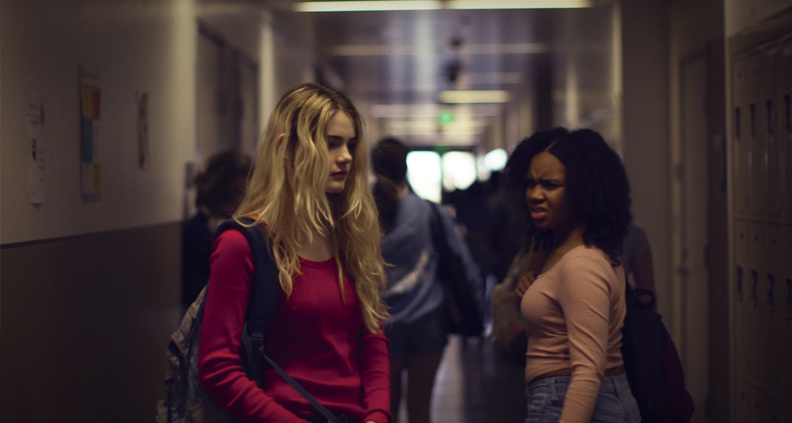
Long Shot directed by Lilly O’Brien
What is the primary idea you want to communicate to viewers in your short?
“I wanted to challenge myself by telling a story centered around a sensitive topic in a way that hasn’t been done before. My goal was to highlight a unique perspective while incorporating difficult, relatable high school experiences. Instead of presenting the film like a PSA that feeds audiences information and tells them how to feel and respond, I wanted the experience of watching the film to feel real, different, and personal for each individual. I believe that sitting with the complex ideas and emotions — whether it’s shock, discomfort, or something in between — is the most powerful way to encourage voluntary reflection and, ultimately, change. “ – Lilly O’Brien
“Where did our childhood happiness come from? Back then, even something as small as a balloon animal could spark hours of imagination and laughter. But looking back now, maybe the sense of loss we sometimes felt wasn’t really about happiness itself, but more about the pure way we experienced emotions. Through this short animation, I hope to remind viewers of the innocent wonder and feelings we had when we used to gaze at a balloon.” – Ryu Sihyun
“This short is about the power of nature as an escape from the opaque mud that can be modern life. To the audience — go outside and see the beauty sometime.” – Alex Brown
“The primary idea I want to communicate in this short is that even if something was beautiful in the past, it’s still okay to let it go if it just can’t work in the future. I struggle a lot with wanting to hold on and fearing change but ultimately part of being a person is change, and it is scary, but it’s also worth it. We can honor the memory of the past and still be okay letting it go when it’s time, but it is really hard.” – Gabriella Marinace Lee
“That phone addiction is real, and it can shape how we connect, act, and even define ourselves. But also, there’s humor in how extreme it’s gotten.” – Bardia Seiri
“The main idea I want viewers to take away from my short is that when there isn’t a clear path for your dreams, or even a blocked path, it’s ok to fight your way through to make your own way. Wendy had a goal of making it to college and escaping the “housewife life” that had been forced onto her. Even though she had everything in her life standing in her way, she kept pushing and fighting for the life she wanted. So many industries and fields are so difficult for women to break into, but we can’t let that stop us. We have to block out the “narrators” in our lives and keep pushing forward.” – Natalie Yerelekian
“The primary idea I wanted to portray in my film is the importance of listening to and actually HEARING what women of colour have to say. If Claire (the final girl) had been listened to from the get go, so much of what happens in the film could have been avoided. I wanted to show that our voices matter and that we have something valuable to say, something worth listening to.” – Kevwe Ayigbe
“My short “Loneliness” is about the overwhelming solitude of grief. That empty feeling left once someone you loved is gone, it follows you wherever you go. If there’s one idea I hope to communicate, it’s that the grief you feel will get better with time.” – Katerina Carlson
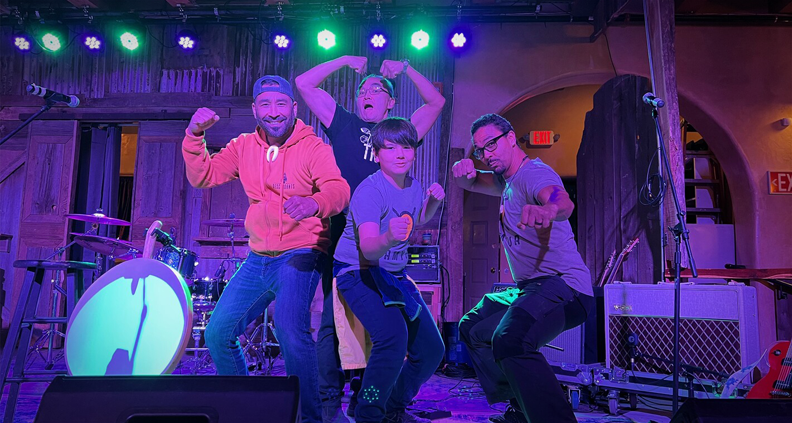
35,567 Yup’ik Stories directed by Magnus Shipe
Do you want to keep making films in the future? What’s your dream project?
“I want people to consider new ideas.” – Magnus Shipe
“I definitely want to keep making films in the future! My dream project is writing and directing a film that is very personal to me — a project that reflects unique, layered experiences in a genuine, relatable way. I’d love to work with a cast and crew that creates a passionate, meaningful, and safe space to take risks and make art that inspires viewers and encourages analysis, questions, and thoughtful reflection long after the credits roll.” – Lilly O’Brien
“I hope my life continues to be intertwined with filmmaking. In the future, I want to create a feature-length animated film that transforms my personal stories into something that resonates with universal emotions. I also dream of making artistically rich films that showcase the beauty of the world in different forms.” – Ryu Sihyun
“Although I don’t necessarily plan to pursue a career path in film, I’m currently entering 11th grade and will be studying Film in the International Baccalaureate Program for the next two years. I’ve only been studying film for a year and have created 3-4 minute short films. My short-term dream project is a longer short film, long enough to be immersive and give more attention to an increasingly complex story and further personal expression.” – Alex Brown
“I definitely want to pursue filmmaking professionally! It’s a bit scary since I think any career in the arts is always a slight risk but I really do love it so much and hope I can keep making films forever! I’m not sure what my exact dream project would be but I have a million ideas, I hope I can make one someday. 😊” – Gabriella Marinace Lee
“Definitely. My dream project would be a coming-of-age thriller that blends comedy, nostalgia, and regret, something personal but weird enough to stand out.” – Bardia Seiri
“I want to keep making films for sure! I want to improve my artistic vision and my storytelling skills. My dream project right now is fortunately in development, it’s called Freudian, about the idea that love now is plastic and inorganic. I want to explore that aspect of our modern society while also giving my view on it in my film.” – Natthawee
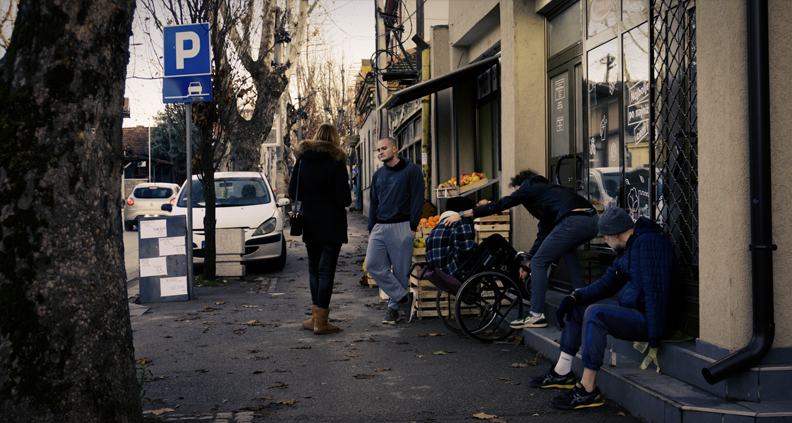
Dancing In The Stars directed by Lazar Jovanović
“I definitely will continue to make films for the rest of my life. I will be starting at USC’s School of Cinematic Arts as a Film and Television Production major in the fall and am so excited for all the films I will work on and create there. A career in filmmaking has always been my goal. My dream project would be to make a feature documentary showing the modern-day effects of the Armenian Genocide. This past summer, I made a short documentary about my family’s history
escaping the Armenian Genocide and what effect it has had on multiple generations. I know every Armenian family has stories that have sent ripples into their generations, and yet so many Americans have no idea what the Armenian Genocide even is. To be able to make a film that communicates to the world the hurt that the Armenian people have faced, but even more than that, the strength and resilience we have had to overcome all we’ve faced, would be my absolute dream.” – Natalie Yerelekian
“It’s my dream to be a successful film director so I will be continuing to make films! My dream project is simply being able to tell stories that allow marginalised groups to feel seen and heard (and, I’ll be honest, a superhero project would be cool too!).” – Kevwe Ayigbe
“I hope to make films for the rest of my life. I’m so excited to enter this industry, telling stories for as long as I can. My dream project is to write and direct a Muppet movie.” – Katerina Carlson
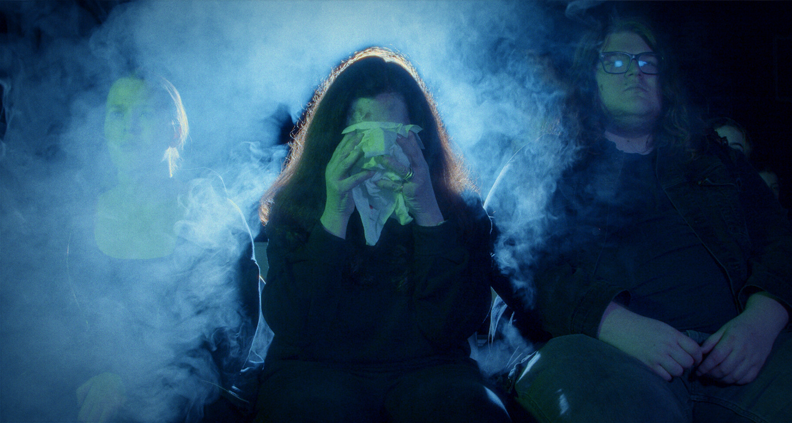
Stage Fright directed by Dean Gofung
For over 40 years, Film Independent has helped filmmakers get their projects made and seen. The nonprofit organization’s core mission is to champion creative independence in visual storytelling in all its forms, and to foster a culture of inclusion. We support a global community of artists and audiences who embody diversity, innovation, curiosity and uniqueness of vision. To support our mission with a donation, click here.
Keep up with Film Independent…
Project Involve Deep Dive: ‘Lonely Blue Night’
We are rolling out some of our past Project Involve shorts to view online! These Project Involve shorts can now be seen on our Film Independent YouTube channel and are featured here on the blog with exclusive talks with the filmmakers. Applications for next year’s Project Involve are now open. This week we’re featuring Lonely Blue Night, written and directed by 2019 Project Involve Fellow Johnson Cheng.
What if your child’s best chance at success was to send them to live with another family?
Johnson Cheng, 2019 Project Involve Writing/Directing Fellow and writer/director of the short film Lonely Blue Night, thoughtfully approaches the consequences of a dilemma faced by many parents.
Lonely Blue Night follows a Chinese family on the night they reunite with their daughter in California after sending her to live with an American homestay family.
As the night progresses and tensions rise, the film becomes a stirring, raw and emotional exploration of cultural expectation, love and regret, the ‘American Dream,’ and the meaning of family.
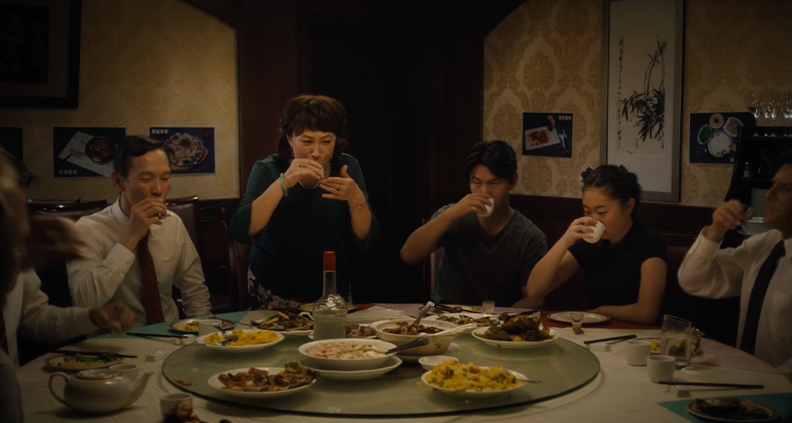
Johnson Cheng is a Chinese American writer/director hailing from the San Gabriel Valley of Los Angeles County. His short film, Iron Hands, premiered at the 2017 Tribeca Film Festival, and his films have collectively screened at over 100 international film festivals, including Tribeca, TIFF Kids, Reykjavík, Nashville, and Palm Springs. He is a recipient of the Princess Grace Award (Cary Grant Film Award) and an alumnus of the NYFF Artist Academy, Telluride Student Symposium, Reykjavík Transatlantic Talent Lab, and VC’s Armed With a Camera Fellowship.
Being from the San Gabriel Valley, Cheng felt particularly connected with the material of Lonely Blue Night.
“This was the first time I got to make something in my hometown—we shot in a restaurant, Top Island Seafood, in this plaza that I had grown up going to as a kid. It felt like I was making a film in my own living room, and a lot of the film grew out of my memories and observations in this space,” Cheng says in reflection.
His goal with the film was simple: “I think I was still very early in sorting out my own cinematic language and was trying so hard to define it in some small way through making of this film,” he said.
“But now, years later, I feel like I’ve changed so much, and so has my relationship with cinema. Now, when I look back at this film, I can just see it from a distance as a little time capsule—a small snow globe of what this corner of the San Gabriel Valley felt like before the pandemic.”
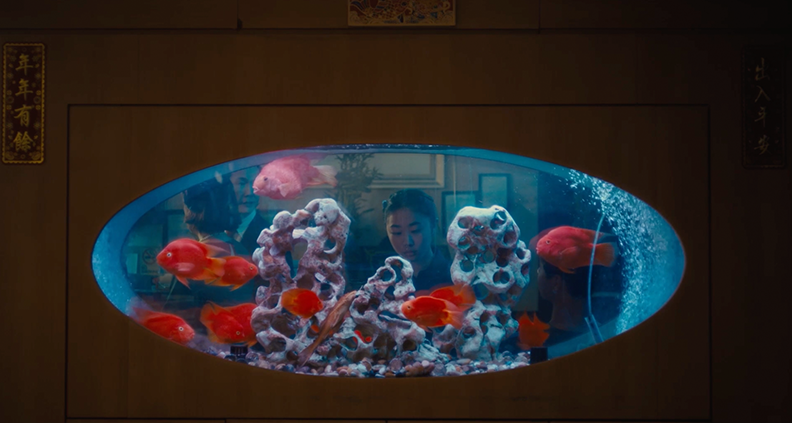
Cheng applied to Project Involve while finishing film school in New York. “I knew that I would be going back home to L.A. after graduating, and wanted to build more community there as I had spent the past few years on the East Coast.”
He was also motivated by the program’s strong reputation, reflecting, “so many filmmakers that I’ve admired over the years, like Andrew Ahn, came out of Project Involve, so I knew it was a special place.”
Reflecting on his time in the program, Cheng highlights the collaborative community of Project Involve and its ability to create lasting connections.
“Working with the producing team—Apoorva Charan, Steve Kim, and our EP, Sydney Lowe—taught me so much about how to be a good collaborator. I’ll always remember their kindness and generosity as I was figuring myself out as a director,” he said. “My cinematographer, Carlo Canlas Mendoza, shot my next short, Only the Moon Stands Still. He is a dear friend, and I look forward to our next collaborations!”
Lonely Blue Night went on to have a successful festival run—it was selected for the HBO APA Visionaries program and screened at AFI FEST in 2020, where it won the Audience Award.
“As far as short films go, it had some legs — we were streaming on HBO for a couple of years, and after that run, we were able to premiere online as a Vimeo Staff Pick.”
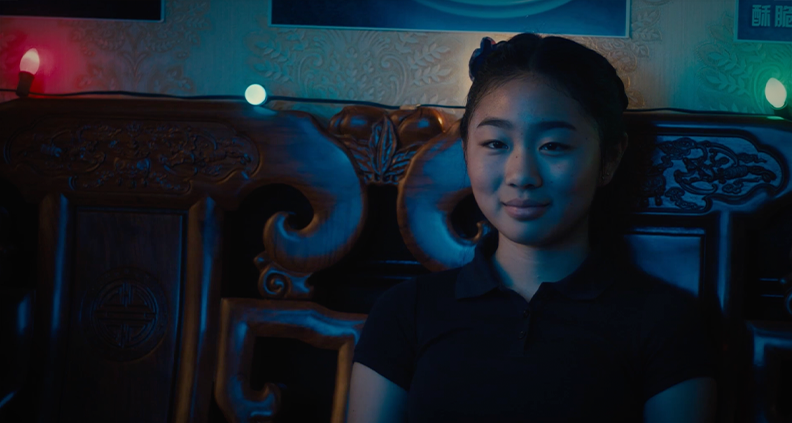
Since his time in Project Involve in 2019, Cheng has kept busy.
“I can 100% say that I have a directing career because of Project Involve—Lonely Blue Night was seen by Destin Daniel Cretton, who became a mentor, and eventually led to the opportunity to direct on American Born Chinese. From there, I joined the DGA and continue directing television to this day.”
The most recent episode Cheng directed for The Chi premiered this past month on Paramount+ SHOWTIME. He has also been developing two features. “I am in a race to see which one will get made first!”
Applications for the 2026 Project Involve program for both live-action and stop-motion animation are now open with the Members Deadline on have until July 28th. Learn more about Project Involve here, and apply today. If you are not a member, you can join here today!
For over 40 years, Film Independent has helped filmmakers get their projects made and seen. The nonprofit organization’s core mission is to champion creative independence in visual storytelling in all its forms, and to foster a culture of inclusion. We support a global community of artists and audiences who embody diversity, innovation, curiosity and uniqueness of vision. To support our mission with a donation, click here.
Keep up with Film Independent…
Meet the New Wave of Visionary Producers in the Imaginar Residency Class of 2025
It’s officially that time of year again – when creativity, talent and career-changing opportunity come together in a big way. We’re talking about the Imaginar Producers Residency.
Film Independent, in collaboration with Searchlight Pictures and the National Association of Latino Independent Producers (NALIP), is back for round two of the residency that’s all about giving indie producers the tools, mentorship and industry access they need to thrive in the studio world. This year’s Fellows are Jesus Garcia, Diego Nájera and Daniel Tantalean.
So, what does the residency entail? First off, each Fellow will receive an unrestricted grant of $50,000 each to fuel and sustain their creative work. On top of the grant, Fellows will receive creative and strategic mentorship tailored to their unique projects and career goals including professional coaching from Renee Freedman & Co., as well as business and financial coaching from The Jill James. Guest speakers include Robby O’Connor from ROC Literary and Anne-Elisa Schaffer from Rightscenter. On top of all that, the Fellows will collaborate directly with execs at Searchlight Pictures to learn the ins and outs of packaging projects for studios.
“We are excited to be working with Jesus, Diego, and Daniel – three exceptional producers who are at the forefront of bold, original and forward-looking films,” said Richard Ruiz, VP of Production at Searchlight Pictures.
“Building on the success of our inaugural year, the Imaginar Producers Residency continues to champion independent producers with the tools, mentorship and industry access needed to thrive in the studio ecosystem,” added Angela C. Lee, Director of Artist Development at Film Independent. “We are proud to support this new class of visionary producers as they forge sustainable, long-term careers in film.”
“Our goal is to provide the three Fellows with the necessary tools and resources to take their projects to the next level. We are excited to see the outcomes of this collaboration and the success of our Fellows as a result of our joint effort,” said Diana Luna, NALIP Executive Director.
The residency officially kicks off the week of July 21. Now, let’s meet this year’s Imaginar Producers Residency filmmakers:
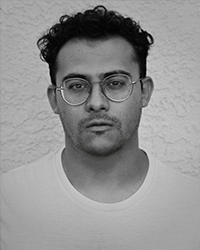
Jesus Garcia
Jesus Garcia is a Mexican-American producer based in Los Angeles. He was previously the creative executive for Epic Magazine, an editorial and production company behind Argo, Radical and Little America. He participated in the 2023 Film Independent Project Involve program, and most recently produced an erotic thriller for Cate Blanchett’s Proof of Concept accelerator program supported by Netflix. Prior to Epic, he worked on projects for Big Beach Films, Starz and 20th Television.
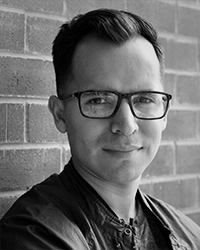
Diego Nájera
Diego Nájera is a producer with over a decade of experience in story development and financing. He recently served as Director of Narrative Film at the award-winning studio Participant, working on films like Costa Brava,Lebanon, White Bird and the upcoming film The Wave from Sebastián Lelio. Previously, he produced the Academy Award-nominated short film Please Hold, and his work has been recognized at Berlinale, SXSW and AFI Fest.
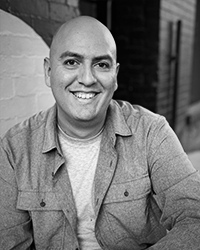
Daniel Tantalean
Daniel Tantalean is an award-winning producer based in Brooklyn, New York. He is the founder of Yellow Nest Films and is known for producing In the Summers,winner of the Grand Jury Prize at the 2024 Sundance Film Festival and nominated for Best First Feature at the 2025 Independent Spirit Awards. Daniel is a 2023 Film Independent Producing Lab Fellow and has been recognized as a 2020 and 2022 NALIP Latino Media Market Fellow. In 2024, he was selected for the Tribeca Creators Market with his feature documentary Rebel Without a Pause.
Film Independent promotes unique independent voices by helping filmmakers create and advance new work. We invite you to become a Member or support us with a donation.
Keep up with Film Independent…